Smacking lips and throwing buckets
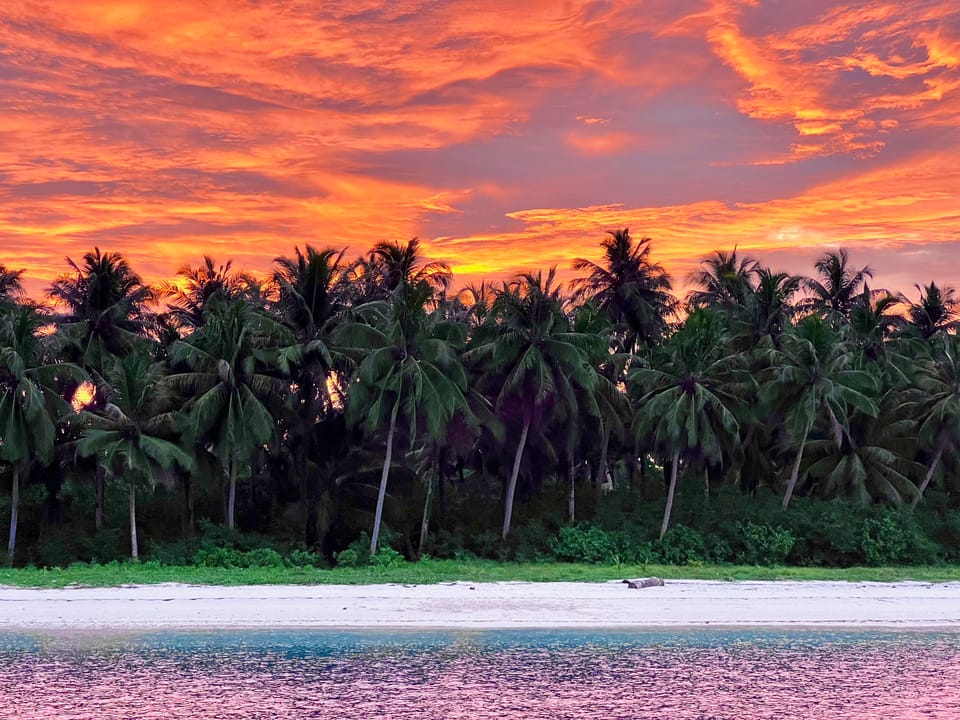
Our first stop on the West Sumatra route is "The "Ments", a chain of about a hundred islands and islets approximately 150 kilometres off the Sumatran mainland. Given the Australian propensity to shorten words both when justified and not, I suspect the colloquial origin of the name can be attributed to an Aussie. In any case, Ments is now forever lodged in my psyche, with sincere apologies to the friendly people of the beautiful Mentawai islands.
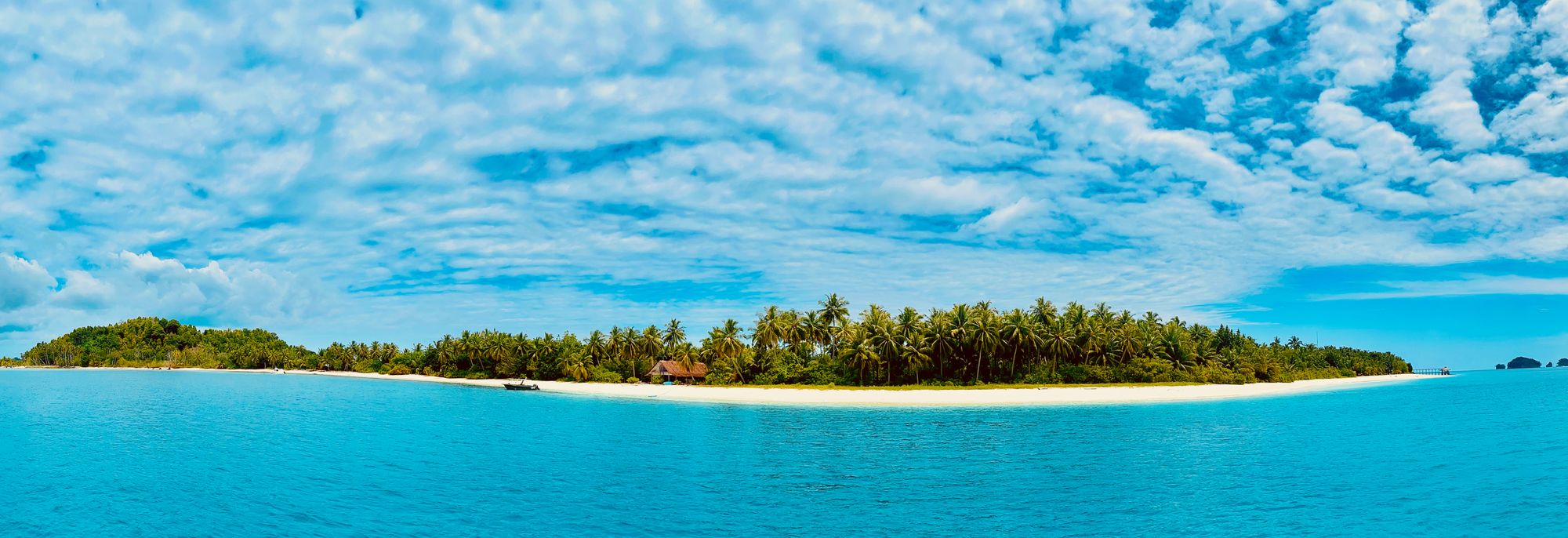
Even for non-surfers like me, the excitement is palpable when we arrive and notice the reef breaks all around us. Time to smack some lips as a friend from another yacht calls it (yes, he is an Aussie), a reference to (I think) hitting the lip of the wave as you cruise along it. The buckets reference escapes me, something about water spraying after you do a big turn on the wave. Surf lingo!
The Ments is famous for its rather savage breaks and accordingly attracts a more experienced type of surfer. The best thing, from my perspective at least, is that the waters around the reef are generally calm so we can approach in dinghy or paddle board for an intimate look at the action which you don't really get in Australian waters.
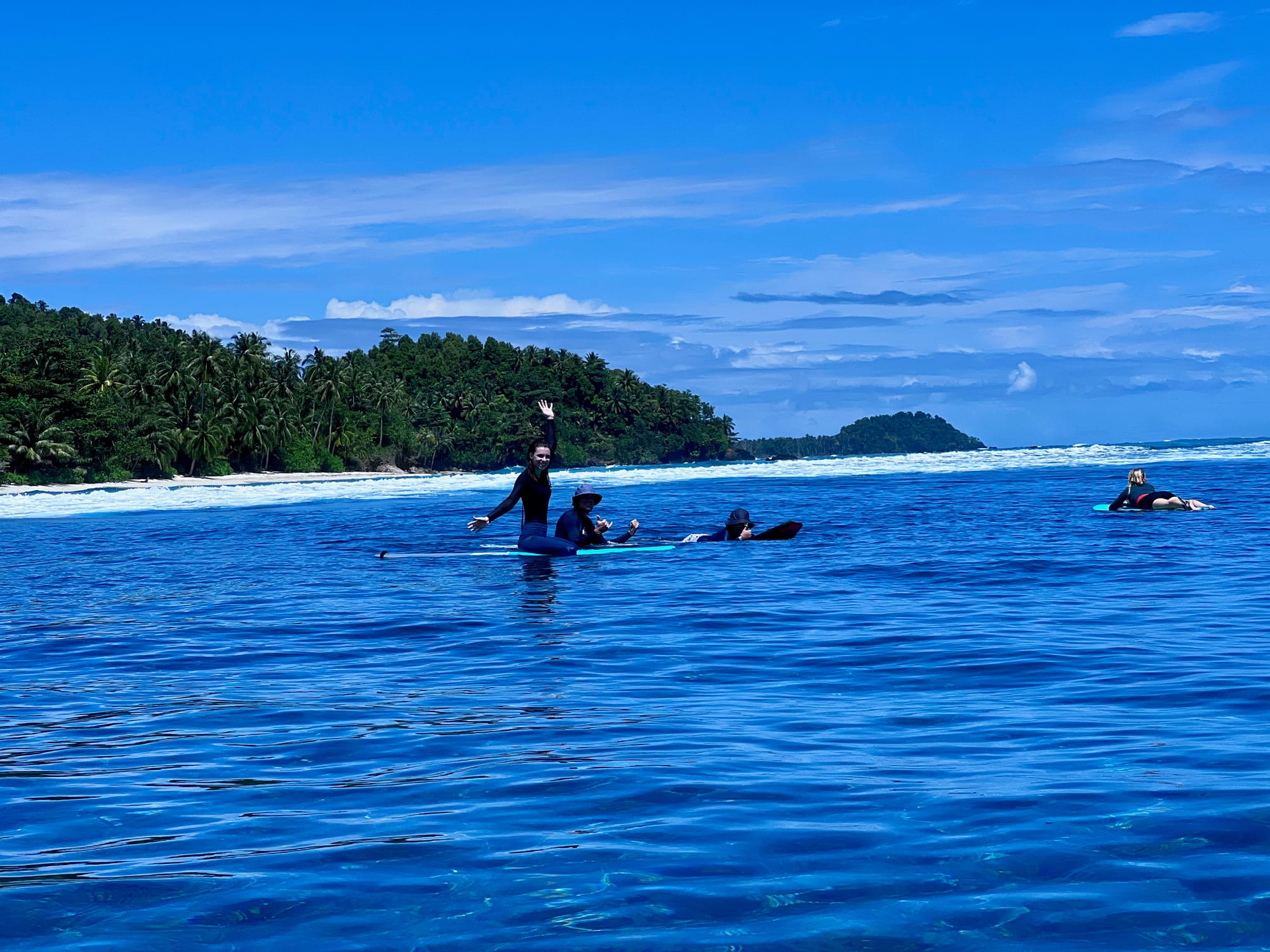
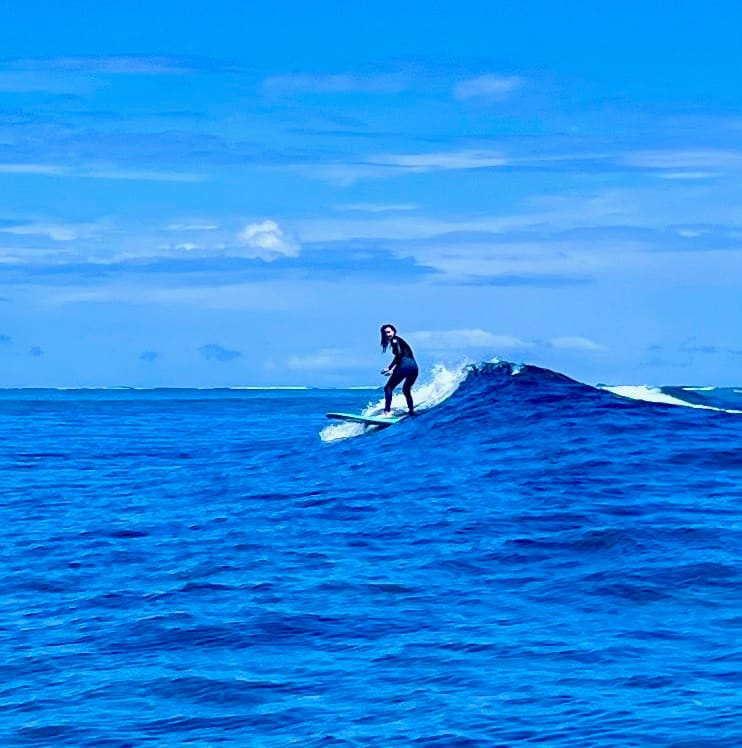
There is one beginner wave that, after some courage gathering, Graham attempts. It's not the only size of the waves that intimidates but the fact they break on a reef, making miscalculations a lot more painful. An experienced surfer died here just a few weeks before we arrived, so safety is no joke. On return from his first surf, Graham is sore and reports the waves are definitely shorter and more fierce than the Newcastle beach breaks he is used to.
On a small day, Lara joins in and manages to stand up straight away, and by some miracle I am right there facing the right way on my paddle board for long enough to snap a photo. Even Jake catches a few waves on his bodyboard. Generally though, the waves are too big and scary for the kids. With break names like Suicides and Scarecrows, you can't blame them although I remain fairly curious about Bumcracks.

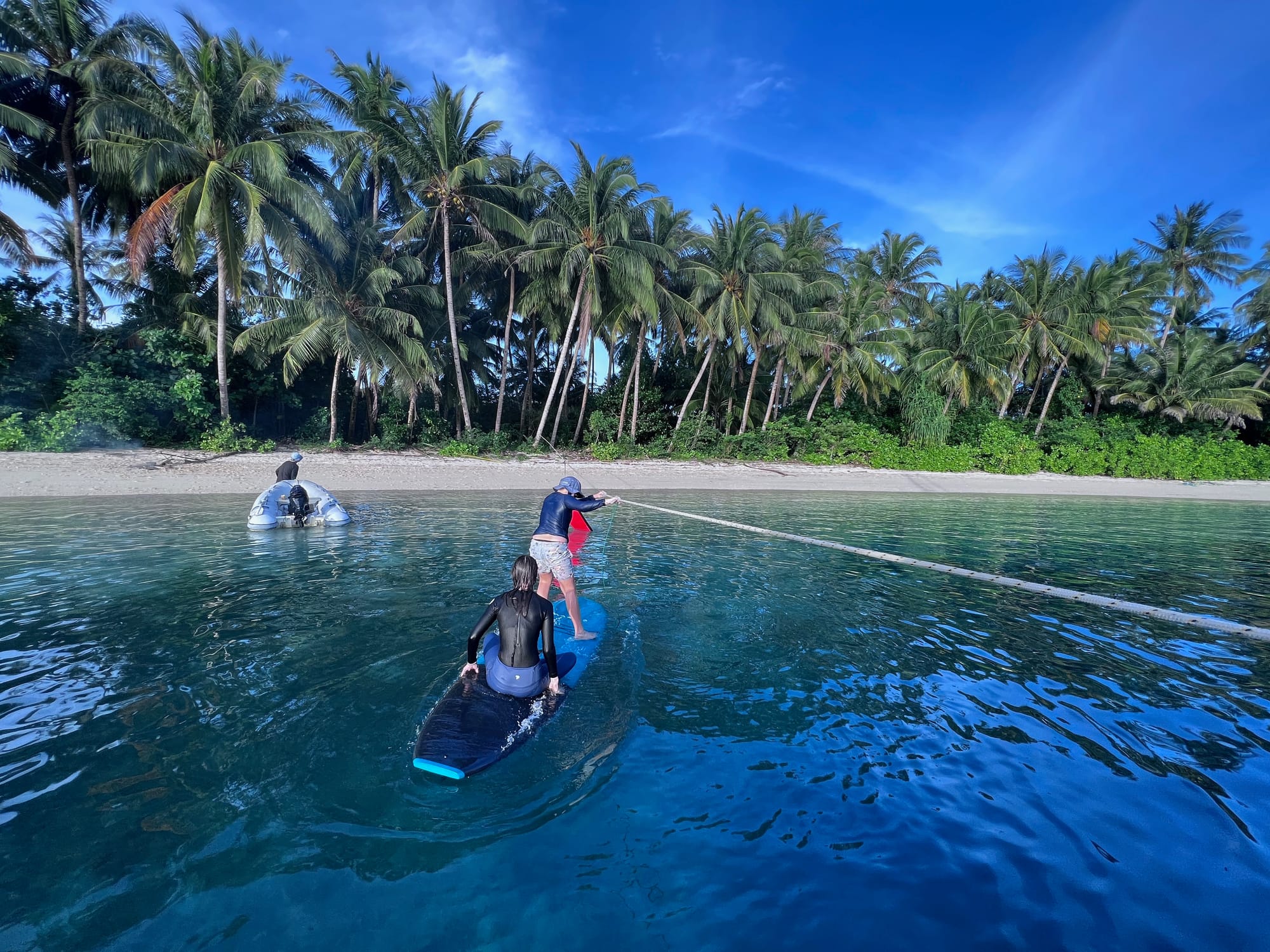
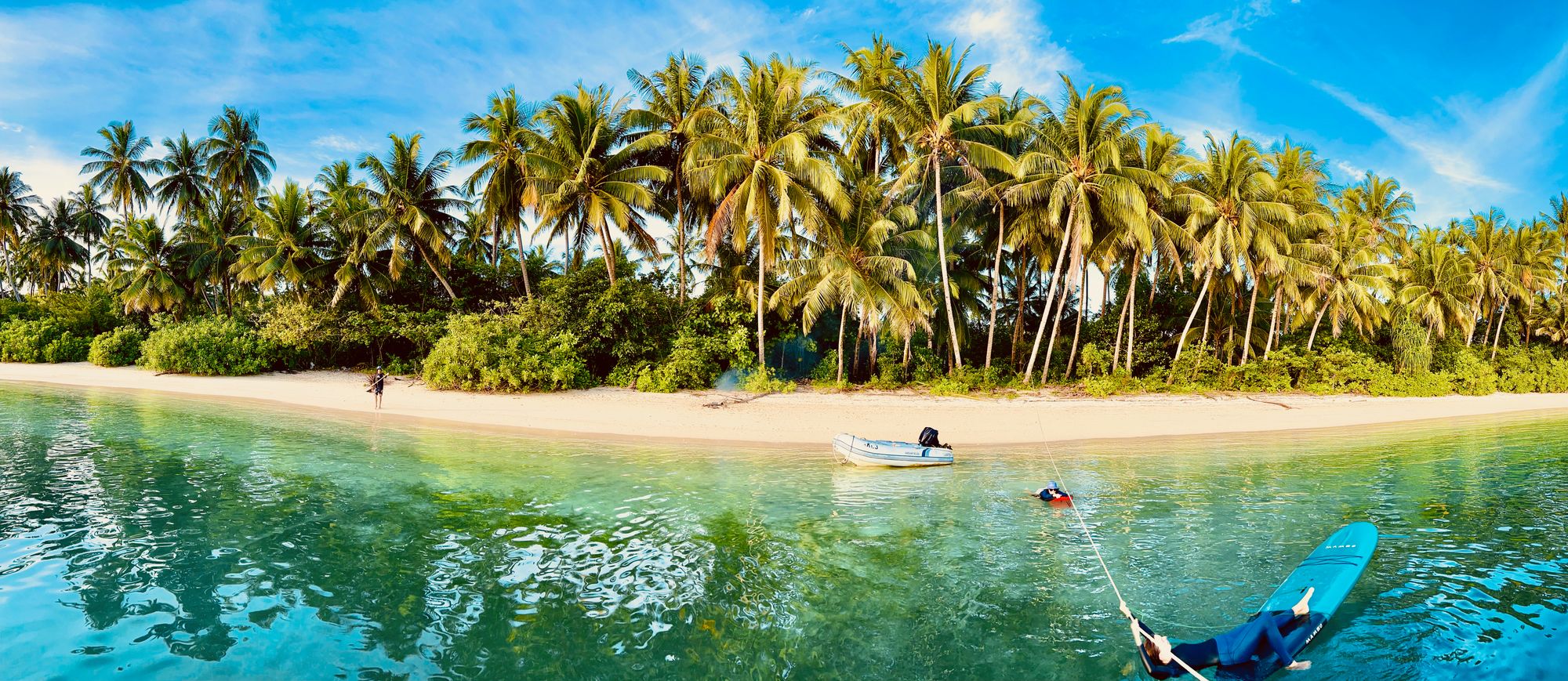
Mango Bay - luscious at day time but vicious sandflies after sunset
It's still very much a bro culture out on the waves here, with fairly luxurious charter boats ferrying boatloads of foreign men of all ages between the breaks, so it's busy out there. Female surfers seem to mainly come from the backpacker crowd who frequent the resorts scattered across the many islands. In any case, the women are far outnumbered by the surf charter bros.
The bro crowds are an issue outside of the water as well - one night, we time our arrival badly at a local hangout called The Bakery serving delectable burgers and pizzas. A large charter boat gets there before us and they absolutely exterminate the place, finishing all the Bintangs and every single burger. We have to subsist on pizzas and another brand of beer but a lesson is learnt, go early or miss out.
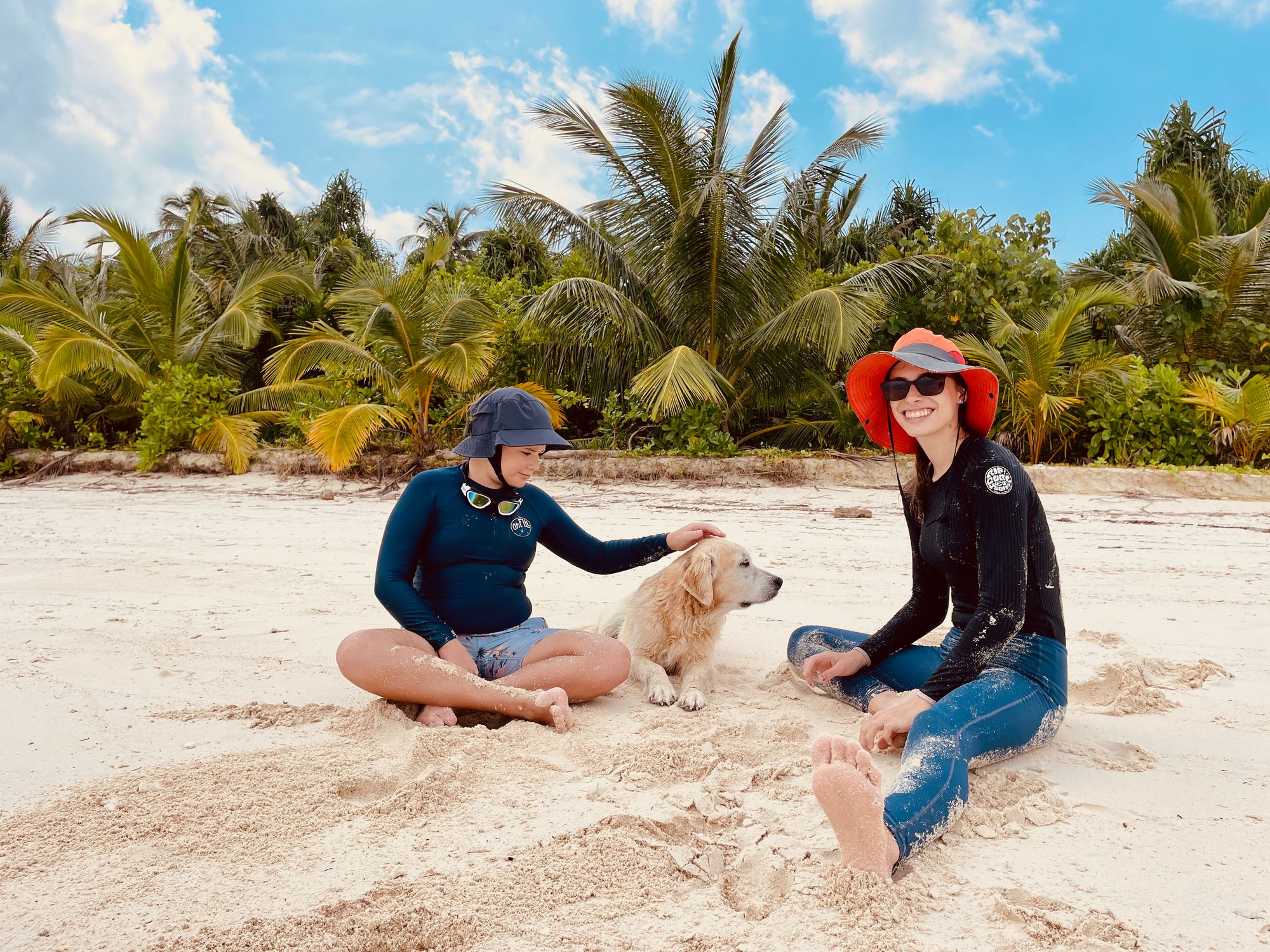
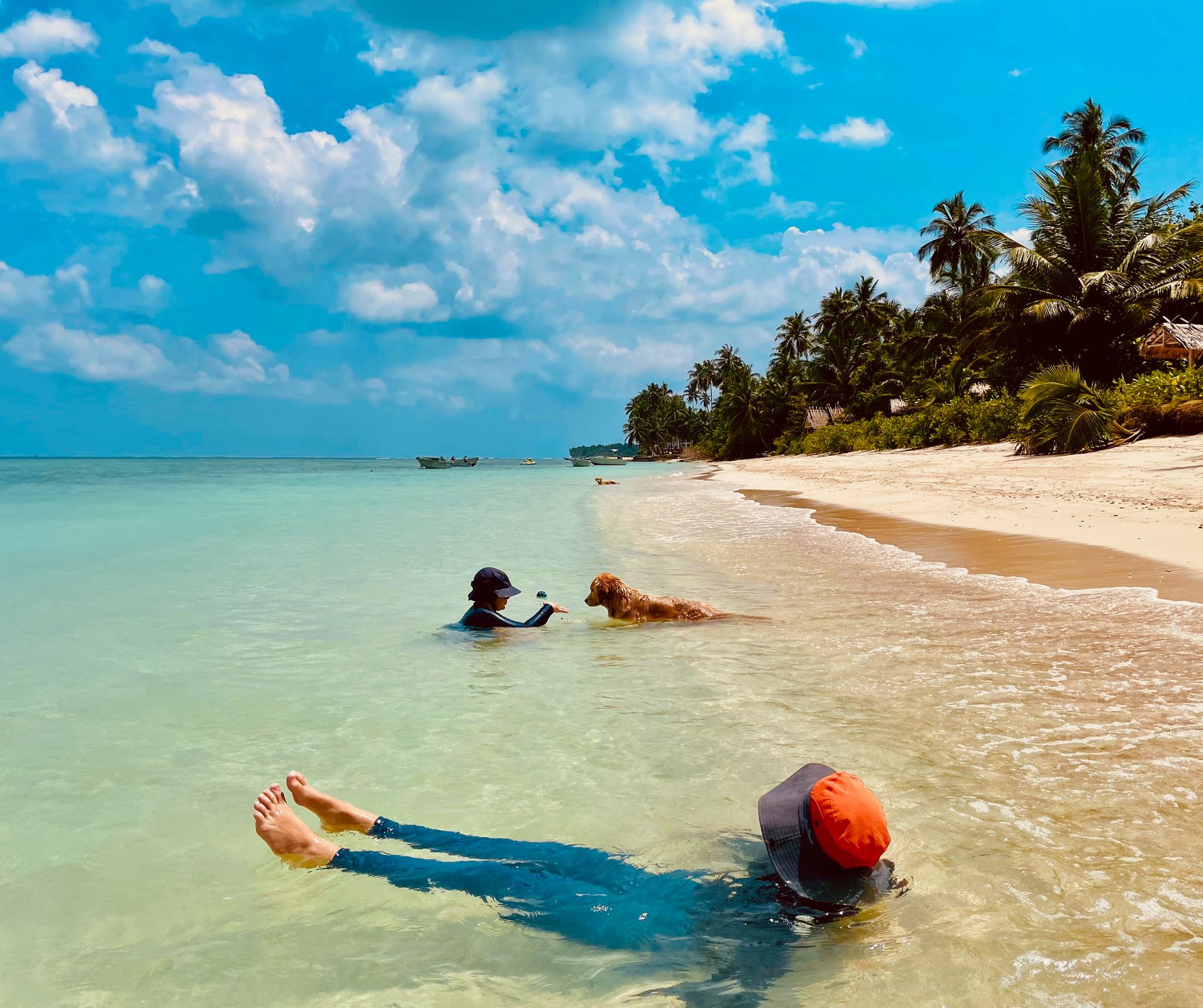
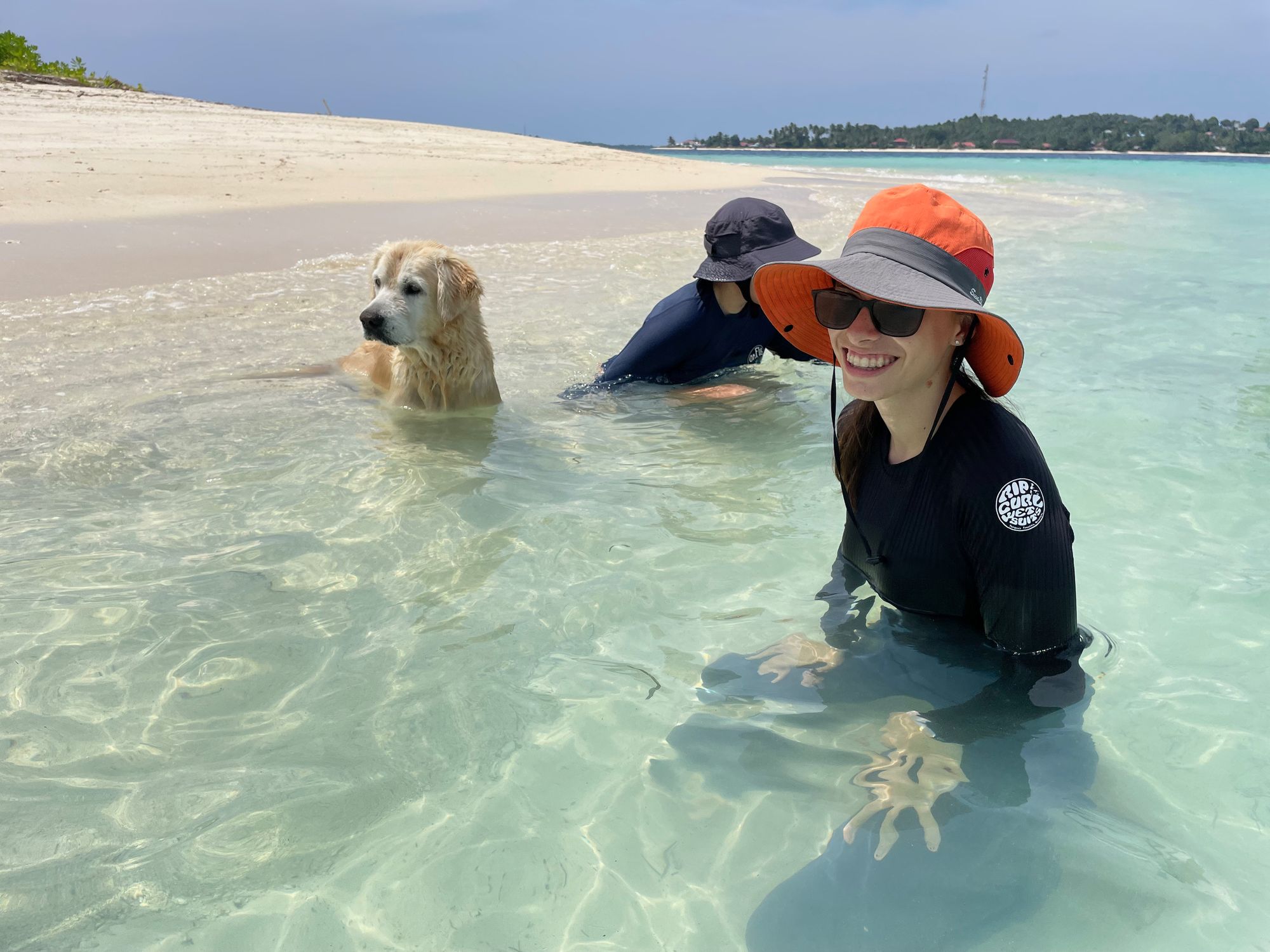
Two resort dogs rule this beach
The local resorts have thankfully so far resisted the rampant over-development seen in popular places like Bali and the like. Here, the resorts stick with the natural island vibe, with huts hidden behind the coconut trees, including fancy cocktail bars and massage parlours.
The town itself is friendly to the extreme and the vibe very slow and relaxed. The main street has the usual mix of shops, warungs, various trade shops and we even find a local tailor busy at work behind a little counter facing the street. From him we buy a new Indonesian flag - although we only have about six weeks left in the country, this is well beyond our current flag's lifespan.
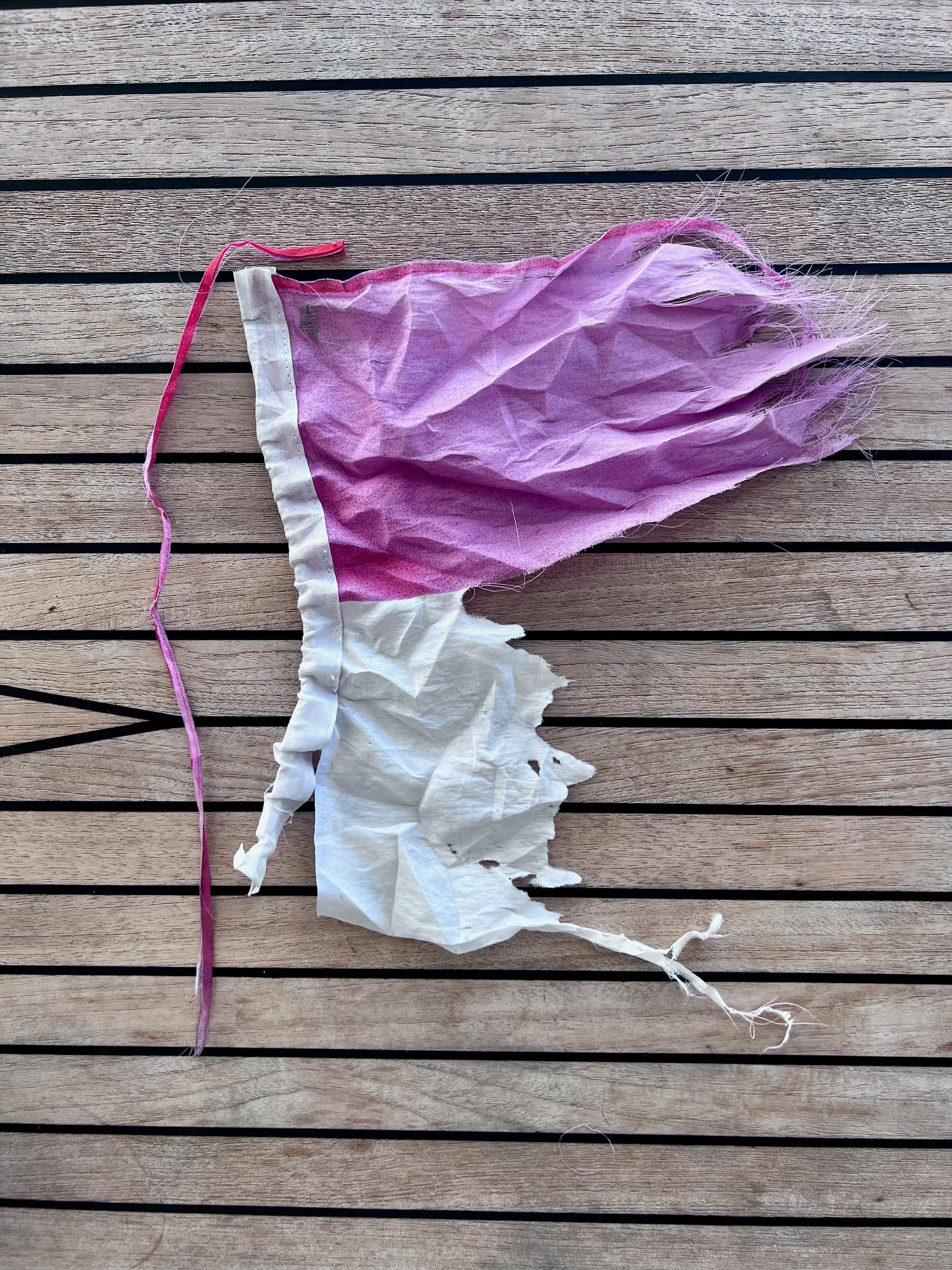
We go in looking for bananas (always), this being a staple for all manner of smoothies on Ausbos so we usually buy at least 5 kgs at a time to freeze.
The local shop has none but the kind owner offers us a small bunch his wife bought earlier for their family. After hearing about the truckload we are after he lends us his scooter and waving his arm along the road tells us to drive 'up the hill' for said bananas. His estimate is 1-2kms to bananas and we head off exhilarated at the sudden freedom of owning a scooter, even if only temporarily. As we climb the hill and one then two kms go by, we start wondering when the banana stalls will appear.
From prior experience, Indonesian estimates of time and distance are not always super accurate, perhaps due to the language barrier but I suspect it's also a cultural thing, where in an effort to please the guest, everything is estimated at 5 minutes or a kilometre away. Anyway, just my hunch, no idea if that's actually true.
Thankfully, promised banana stalls appear not long after first doubts start to set in and we also find lots of other good stuff. Seems the 'wholesaler' fruit and veggie stalls all live on the hill here. Closer to the farm perhaps.
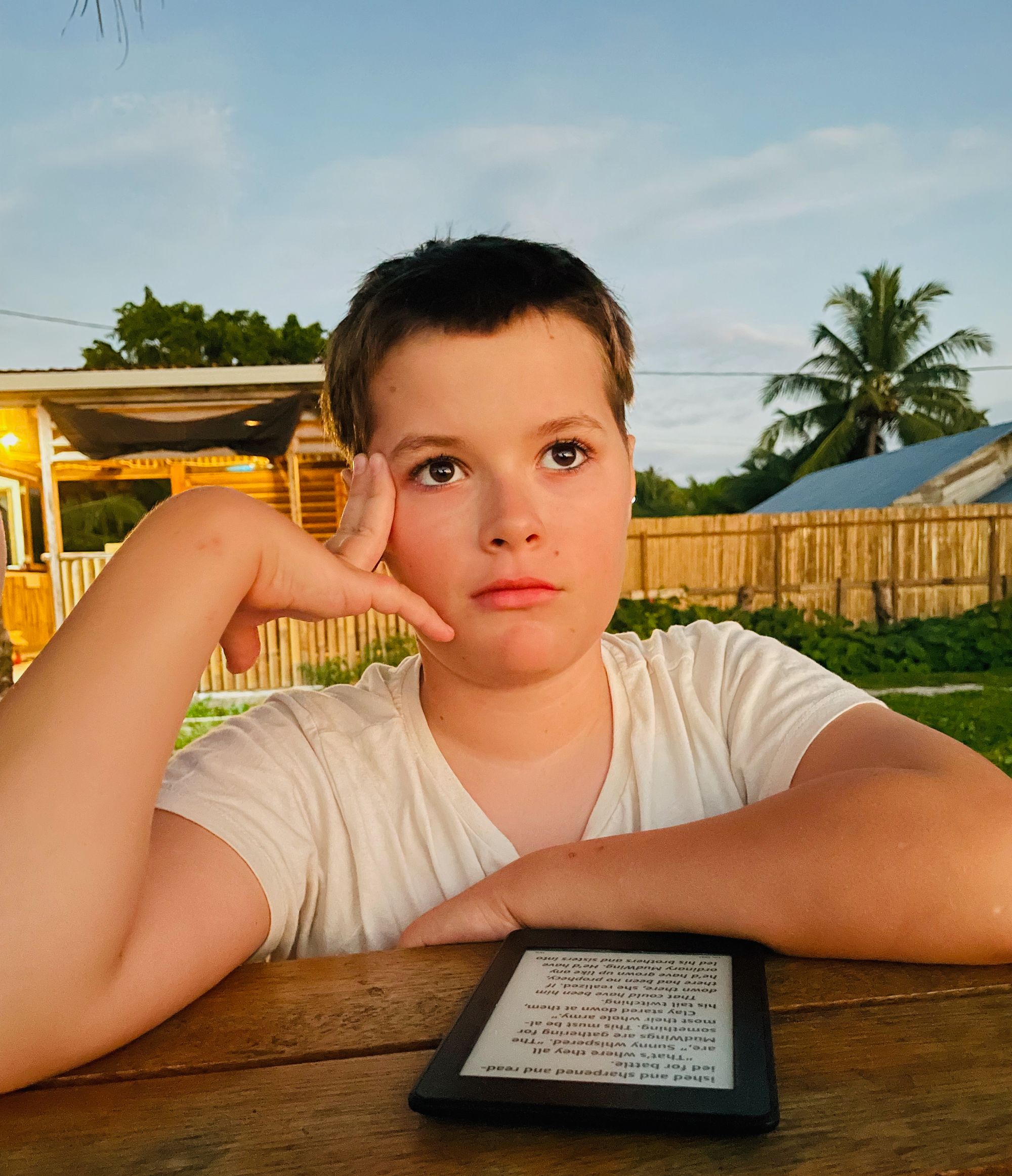
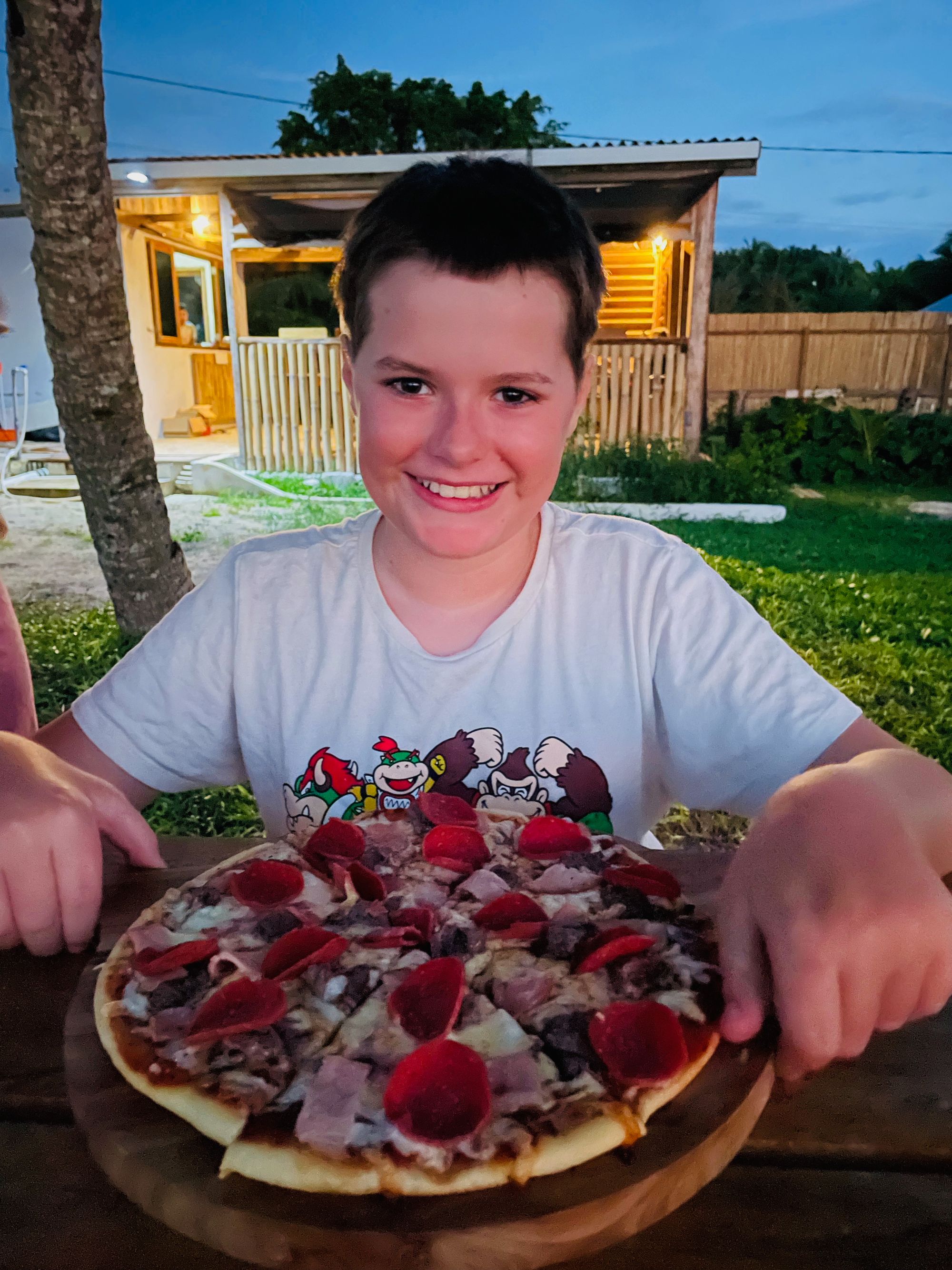
Before and after pizza arrival at the Bakery, Jake's favourite - The Carnivore 😄
Although these islands are some of the most remote we have ever been to, the idea that remote means pristine is somewhat debunked if you look below the surface or examine the satellite image of any island, a habit I can't seem to shake being a sucker for self-flagellation. Almost every time, I find that native rainforest has been cleared for living and agriculture, the latter predominantly for oil and sugar palms as well as coconuts. This is true for population centres and their periphery as well as uninhabited islands, in the Ments and pretty much everywhere else we've been.
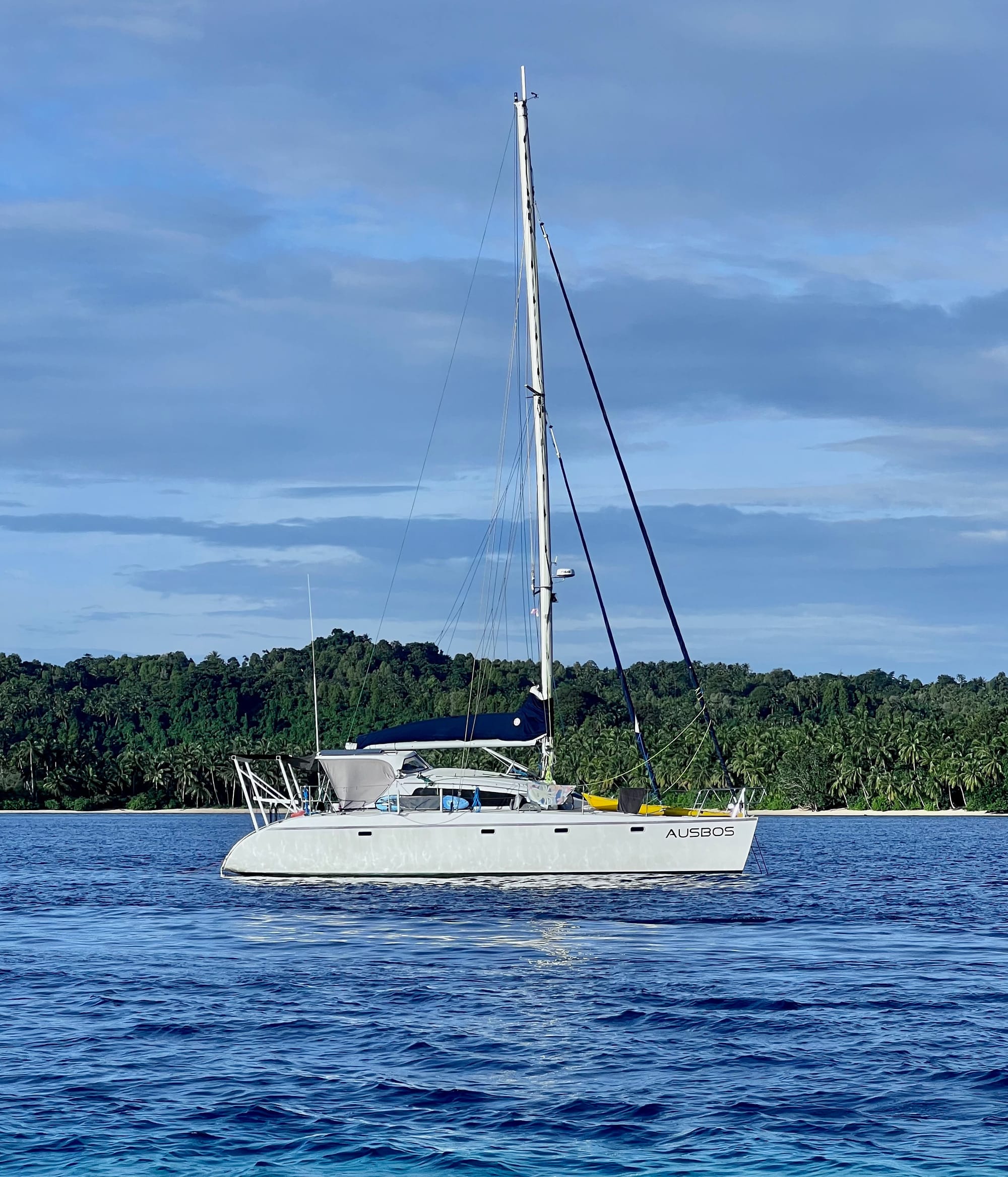
Very few places remain untouched and if rainforest survives anywhere, it's because the terrain is mountainous and therefore not easily accessible or presumably because humans haven't got to it yet. The local population has to eat so you can't blame them but it's sad nonetheless.
Sometimes you have to take what you can get and focus on the good and by any standard, the Ments are the absolute definition of paradise even to seasoned sailors like us. Miles of deserted beaches, crystal clear water and relatively low density of floating rubbish compared to the rest of Indonesia. As much as it pains me to write, we are by now somewhat desensitised to the plastic and hence find it easier to ignore, a sad but sanity-preserving adaptation.
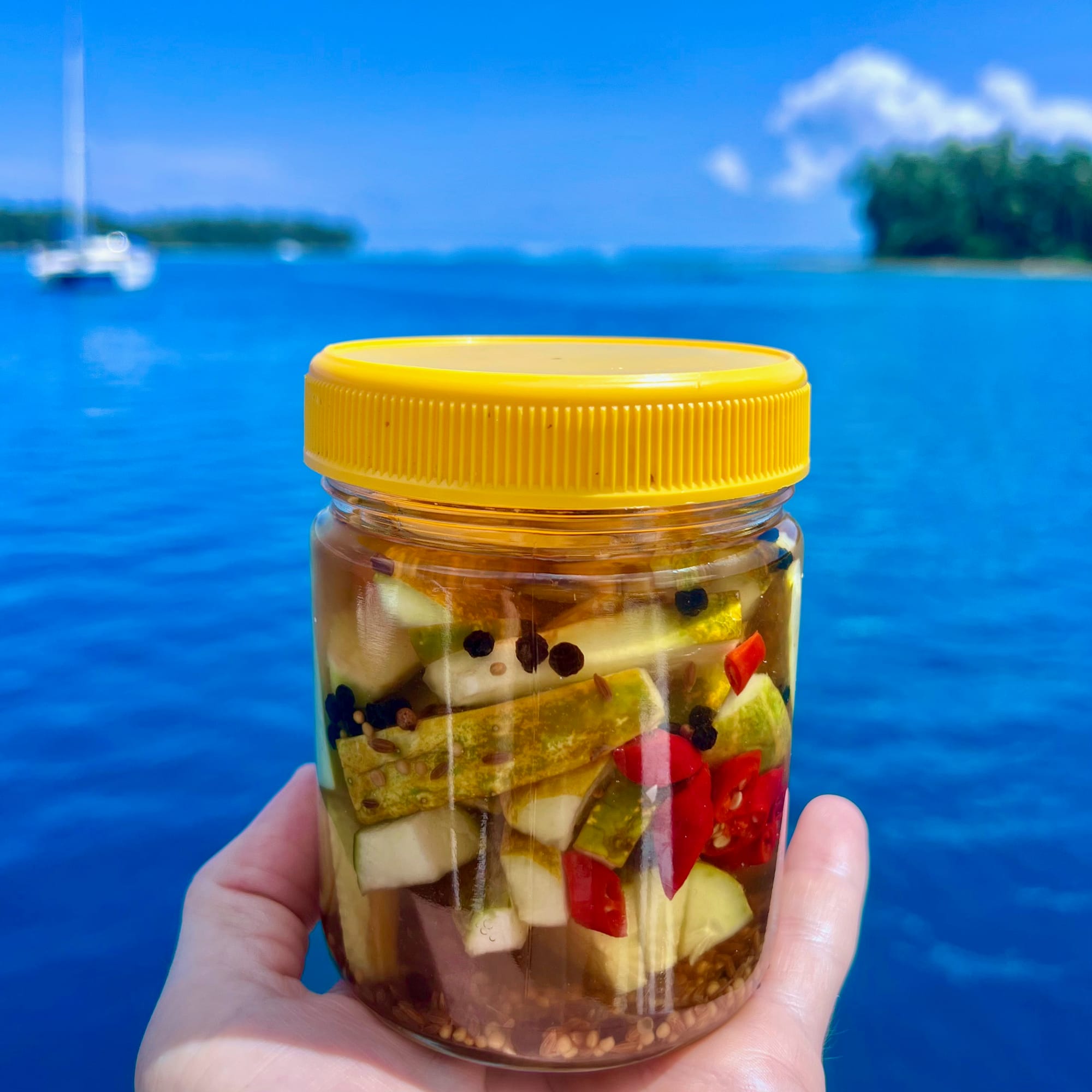
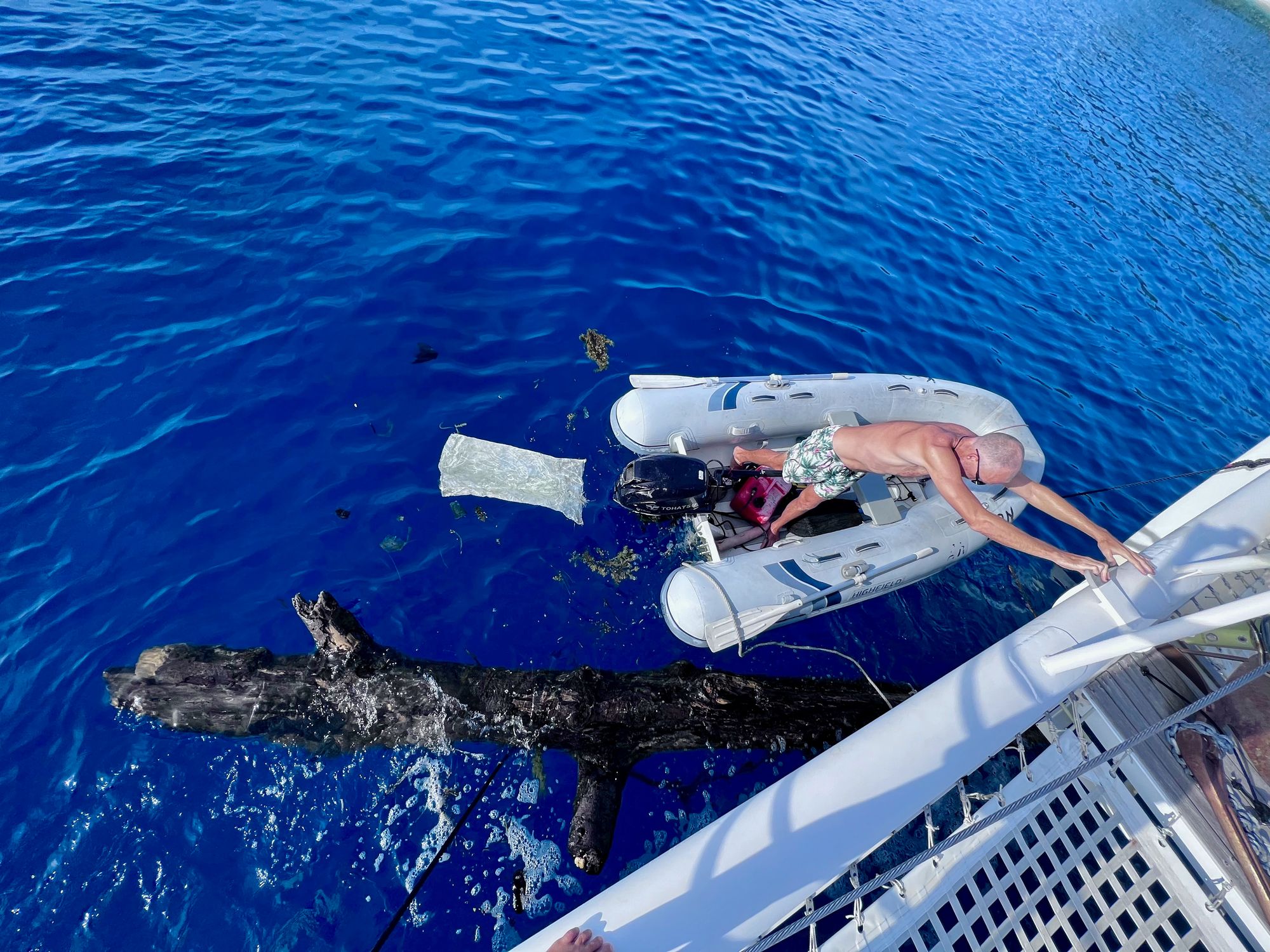
Home made pickles and a huge logs stuck in our anchor lines
If there is a silver-lining to the marine garbage saga (and I work hard to find them), it is that quite a few not-for-profits have sprung up in Bali and Java in the last decade or so, dedicated to stopping plastic pollution at the source. Sungai Watch is one such organisation, formed in Bali in 2021 to remove plastic rubbish from rivers before it flows into the ocean. This is especially problematic during the rainy season when dormant rubbish piles are swept into the rivers through flooding.
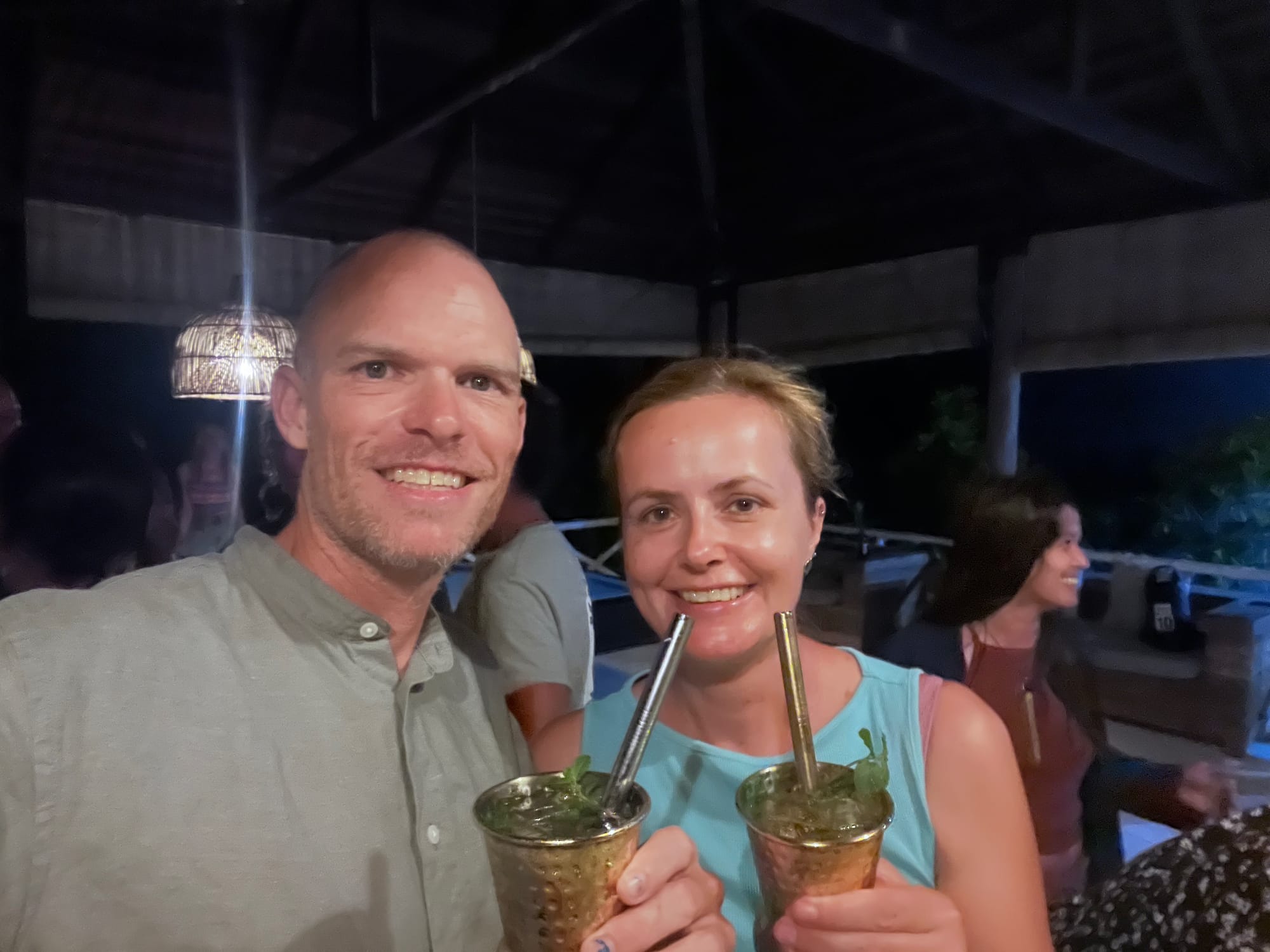
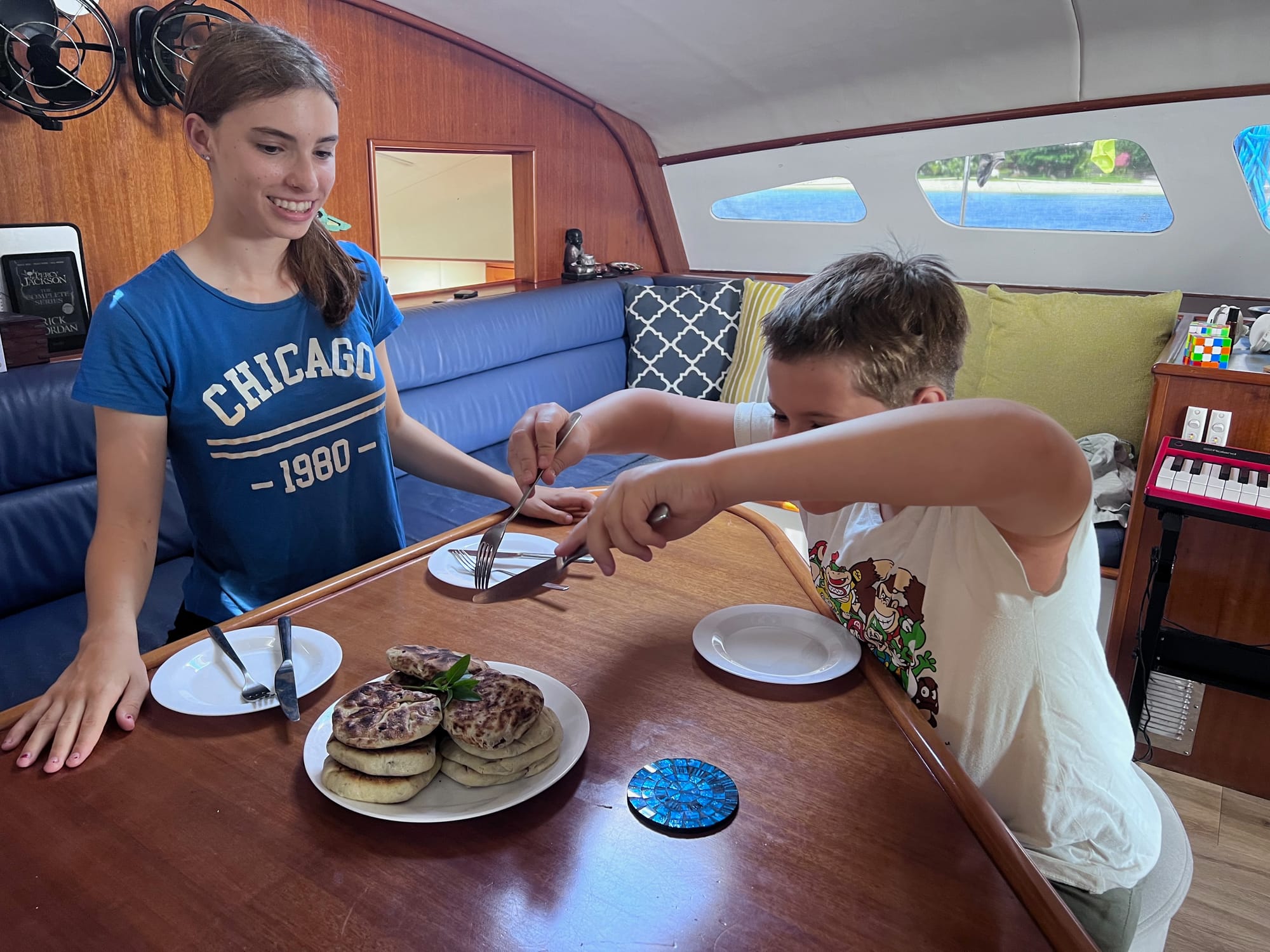
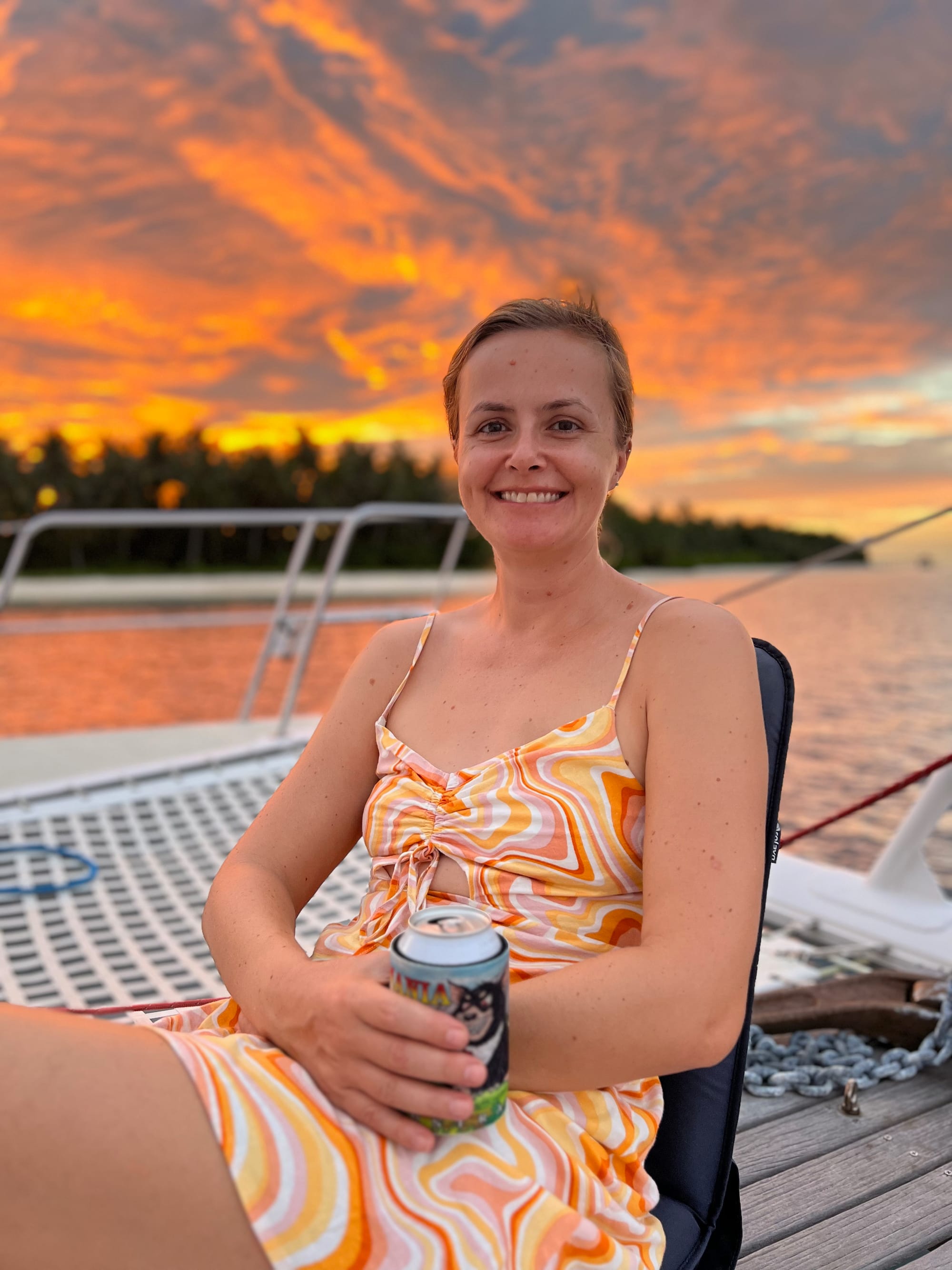
Cocktails at the resort, pancake day and sunset / dress matching
Sungai Watch and other similar organisations clean up polluted rivers, river banks and beaches, install river barriers to catch rubbish coming from upstream after monsoon rain and most importantly sort and analyse everything to identify the top producers of this environmental scourge. What surprised me most reading their annual report for last year (when it really shouldn't) was that a French company which promotes itself as an environmental defender was the top producer of marine plastic in Indonesia in 2023. For some reason I thought surely it's Indonesian companies producing all this crap (and they produce a lot of it) but global corporates still rule the space especially when it comes to water and other drinks sold in plastic bottles.
After the Ments, we head up to Telos, an island chain just to the north, where we meet up with Saltys, an Aussie kid boat we last saw back in the Whitsundays over a year ago. Telos proves to be a gem of a place, with calm anchorages, small surf and epic vistas filled with tiny tropical islands. A balm for the eyes and the soul.
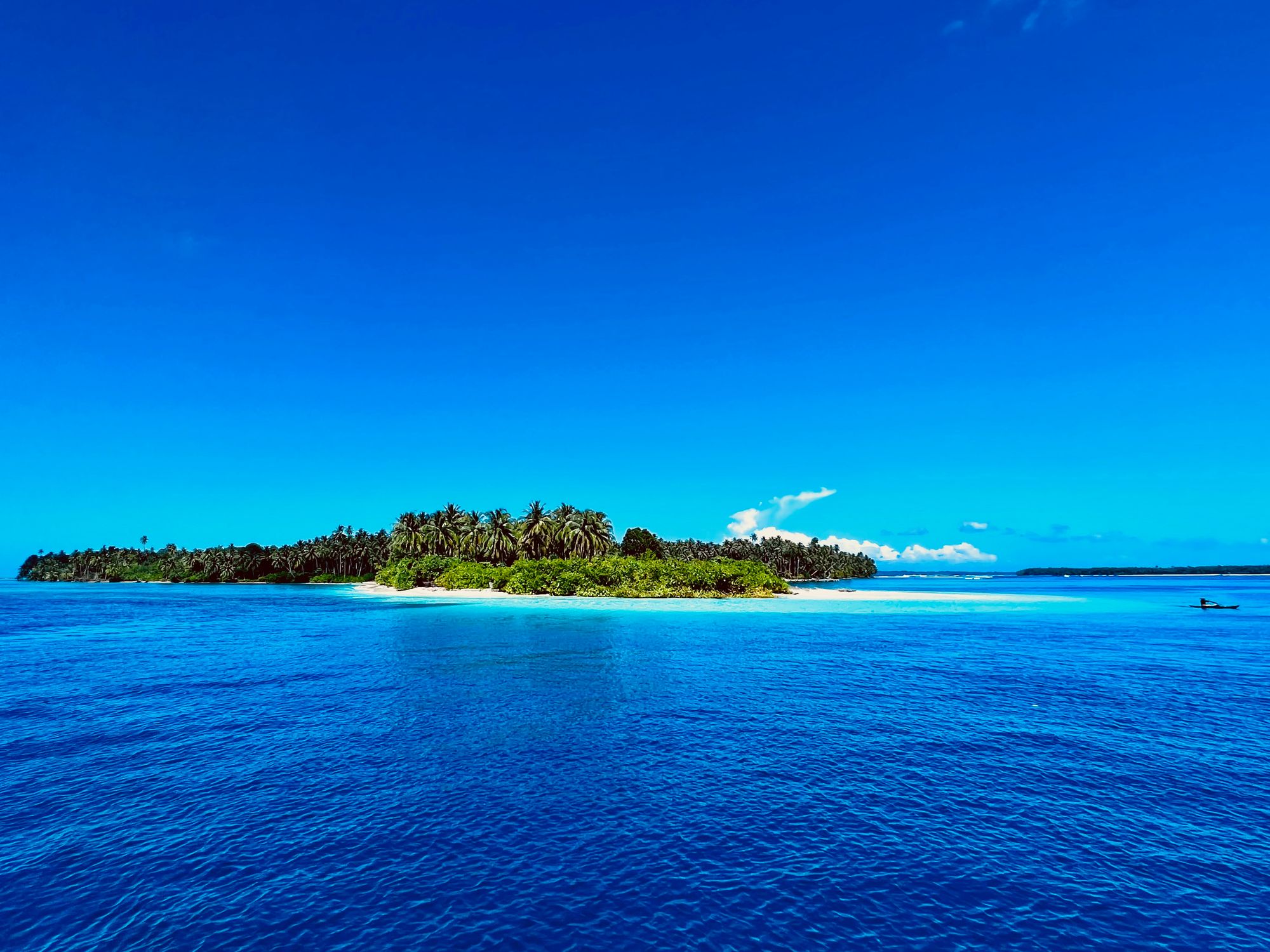
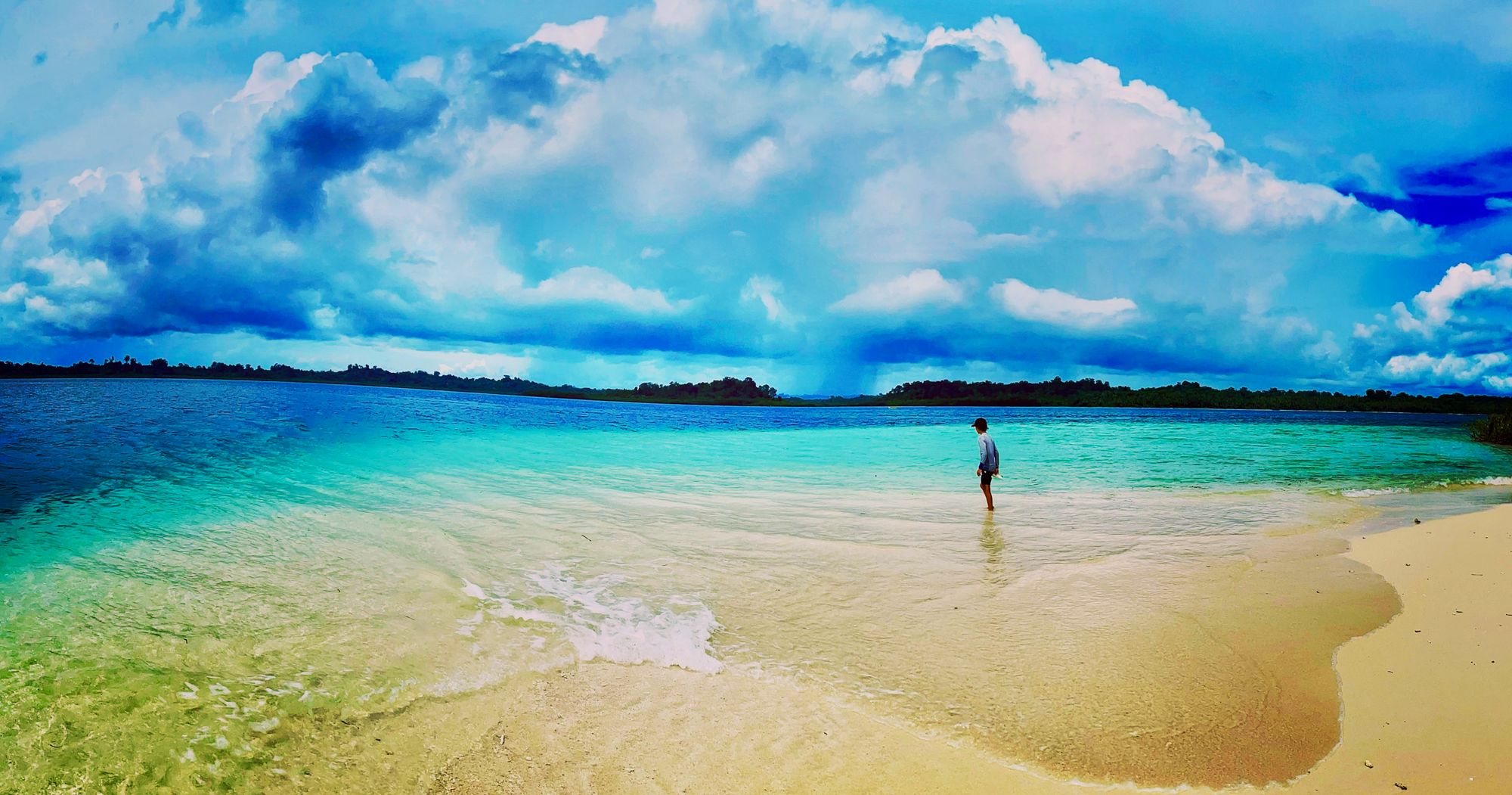
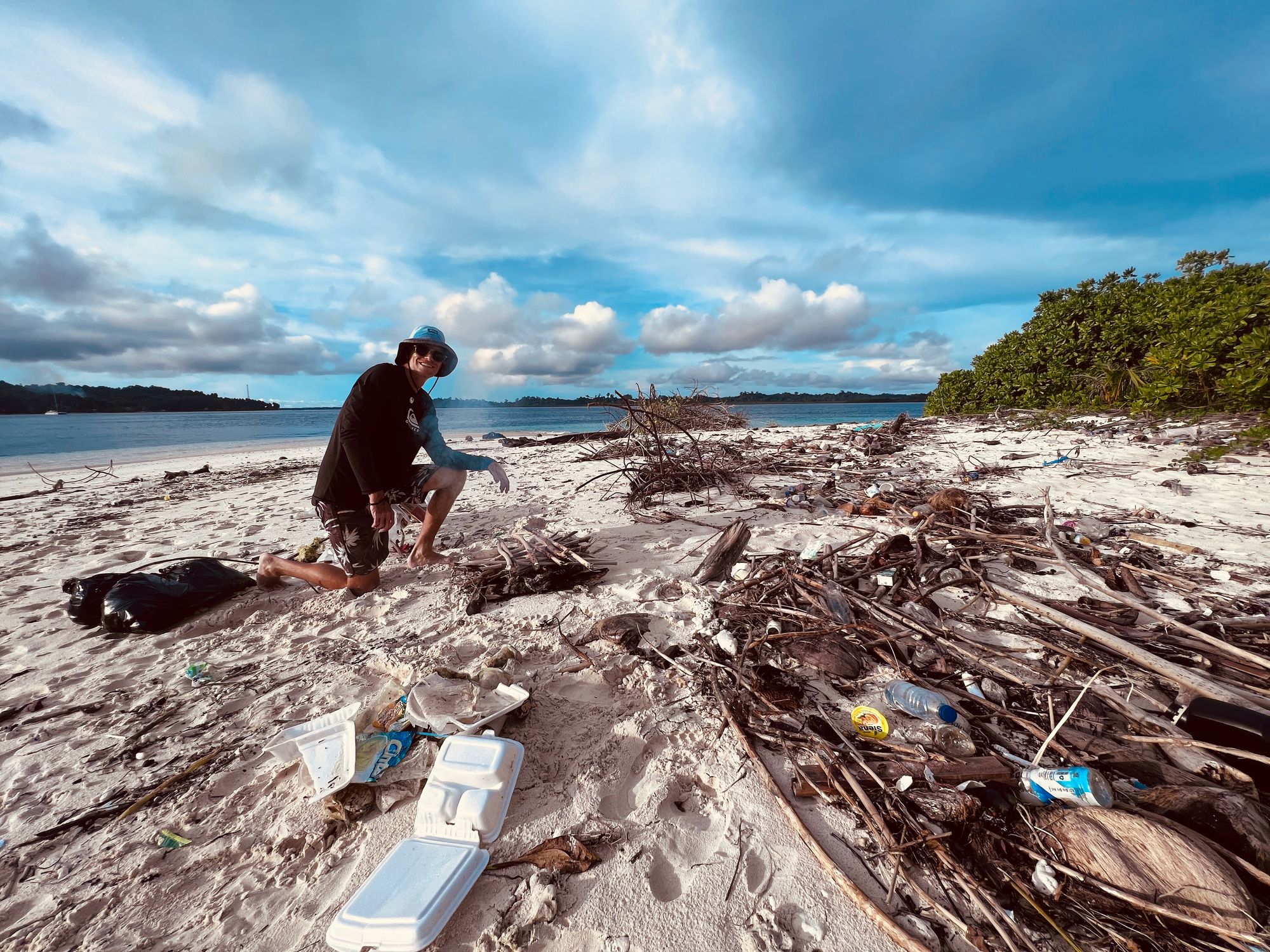
Same spot, different perspective
Telos town is friendly and bustling with colour and character. On a shopping expedition, we're told to find Dino, a savvy shop-owner catering to the needs of cruisers and surf charters. Dino knows his market and his fridges and freezers are jam packed with everything a cruiser is after, including such luxuries as flat breads and mozzarella (cheese!). We even find red capsicums which have not made an appearance since Bali. Being a one stop shop, he also stocks cases of Bintang, tonic water and all the staples. All this right next to the dinghy dock and with staff helping to load everything. For this, Dino's gets the Most Convenient Shop award, Indonesian cruisers edition.
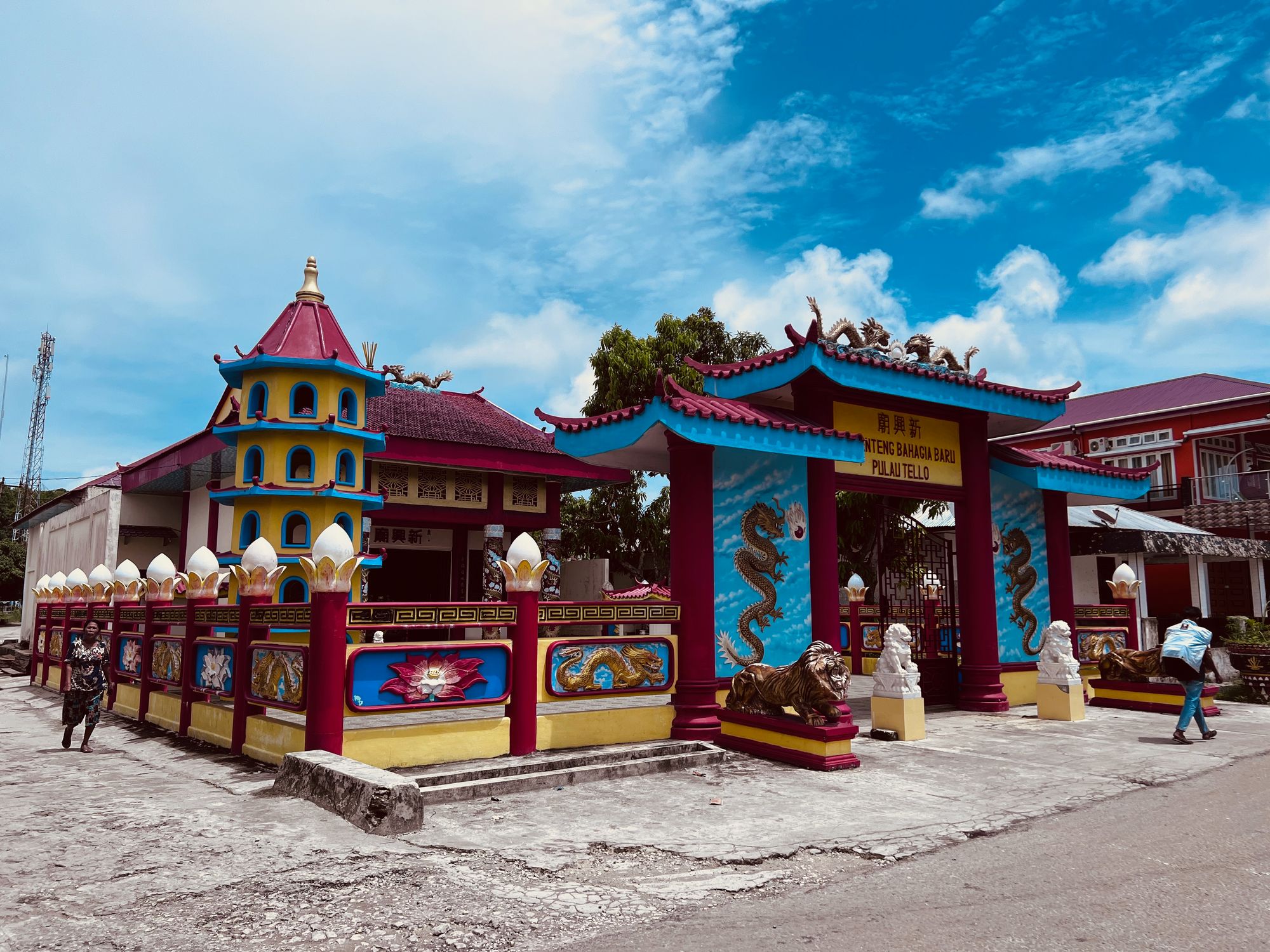
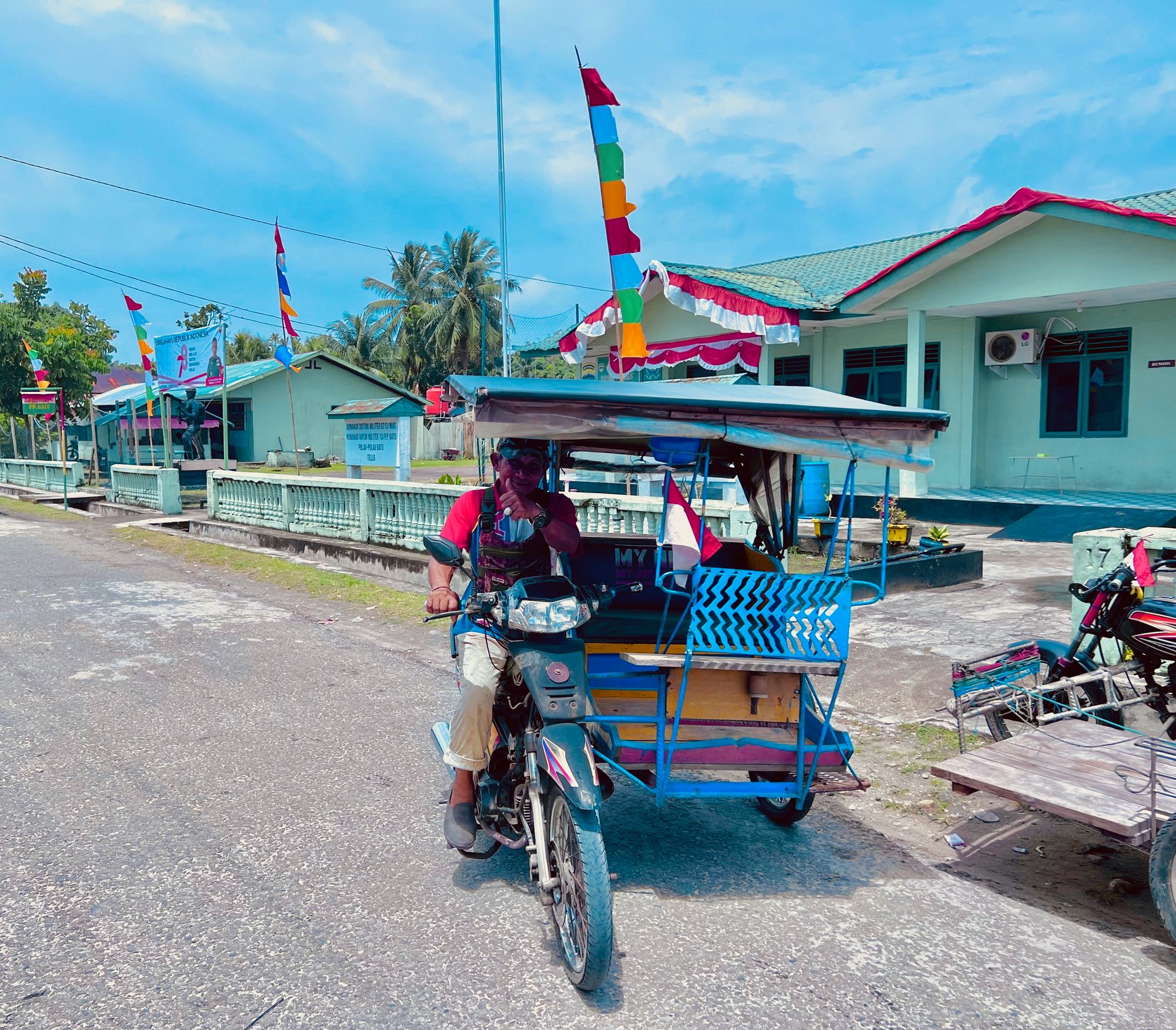
One day, we decide to head to the The Surfing Village resort, on the south end of Telos. It's a place run by a few Brazilians who came here for a surf twenty years ago and never left. Perched on the south end of an island at the mouth of a very quiet bay, it faces a surf break which ends mere metres from the reef, the danger evident in the patches and scratches on the bodies of the returning surfers.
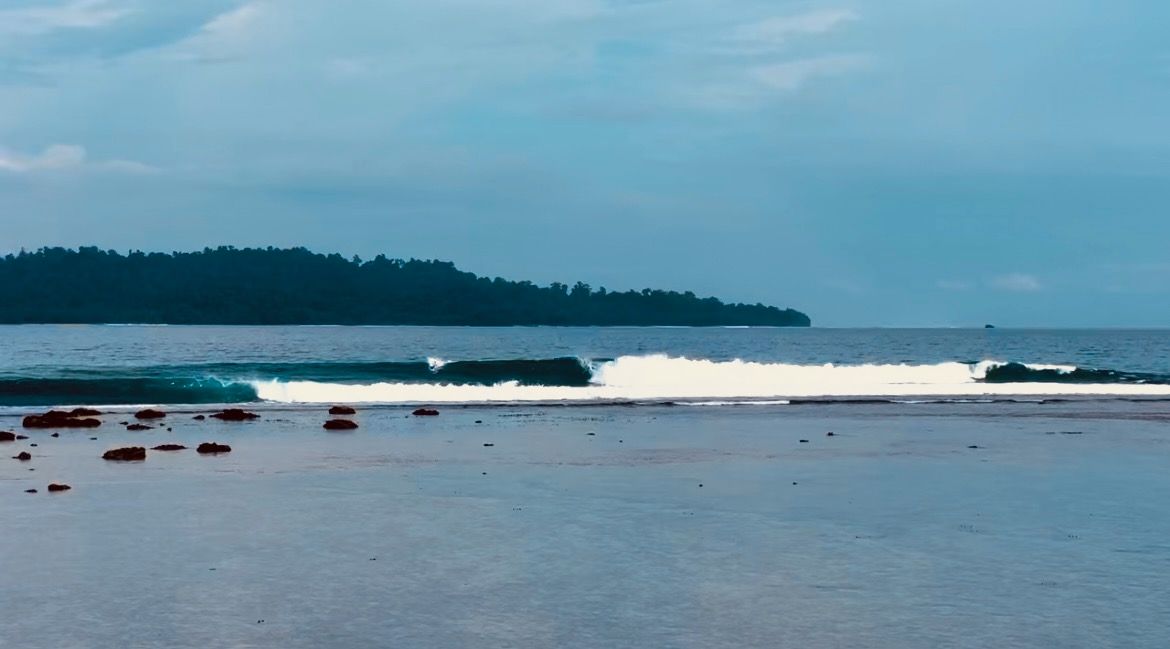
Walking back across the rocky beach, they call out for fresh lime to disinfect their wounds, bar staff or another surfer always around to tend to their wounds. Injury seems like a well accepted occupational hazard here; as we sip our coffee one of the Brazilian owners gives us a detailed tour of his injuries including a major gash on his torso which he admits 'hurts' and will keep him out of the water for 'a while'.
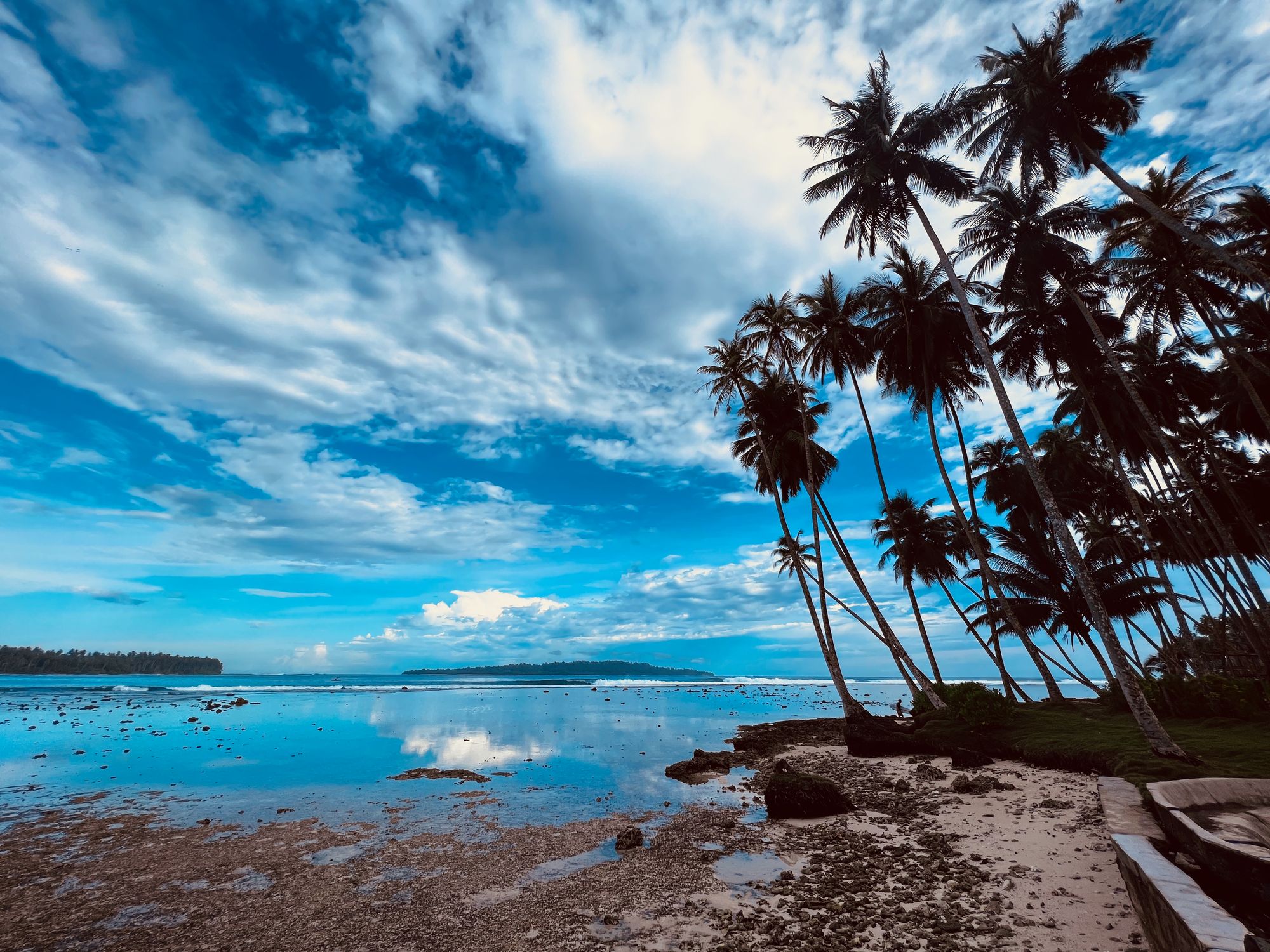
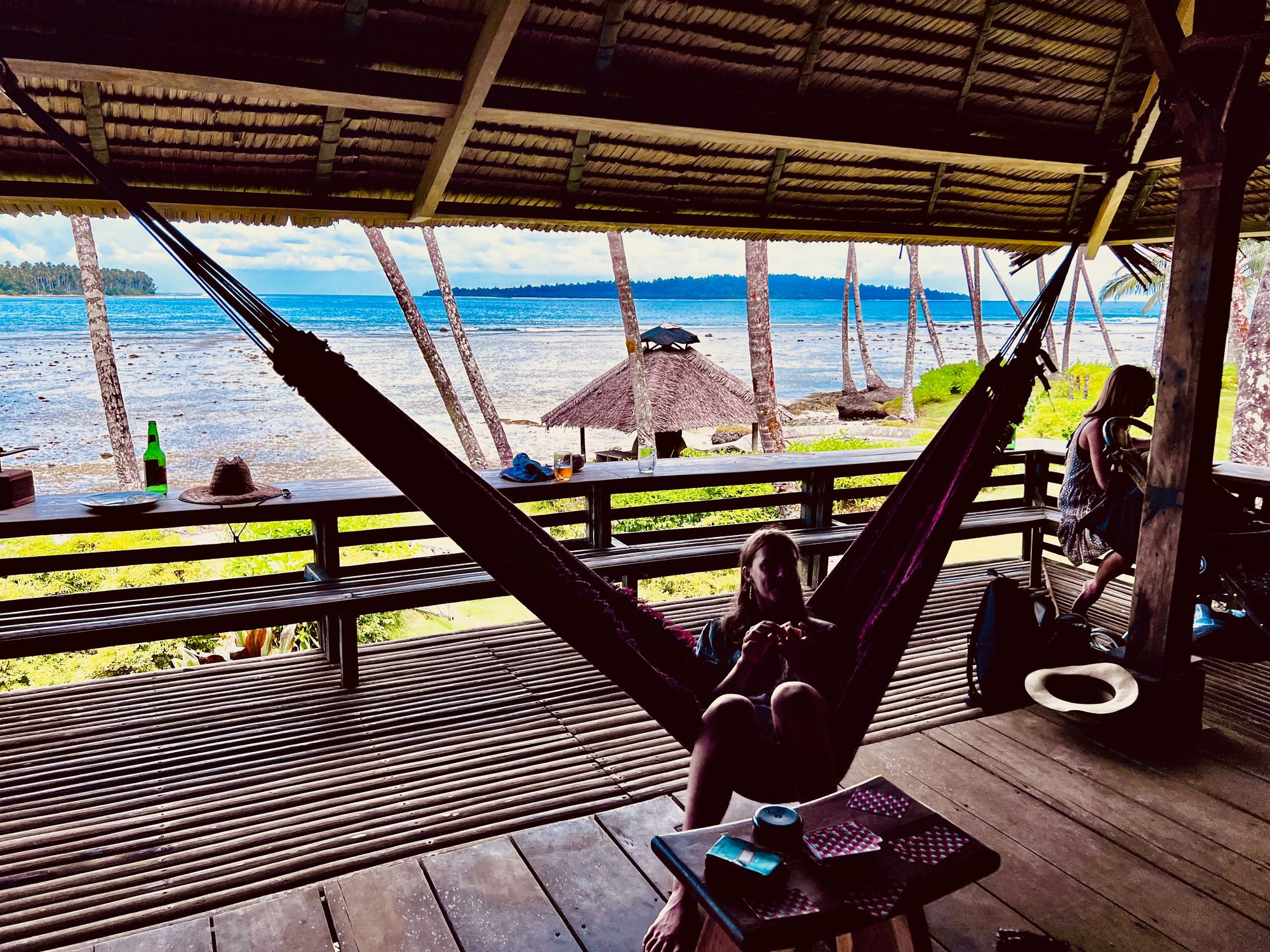
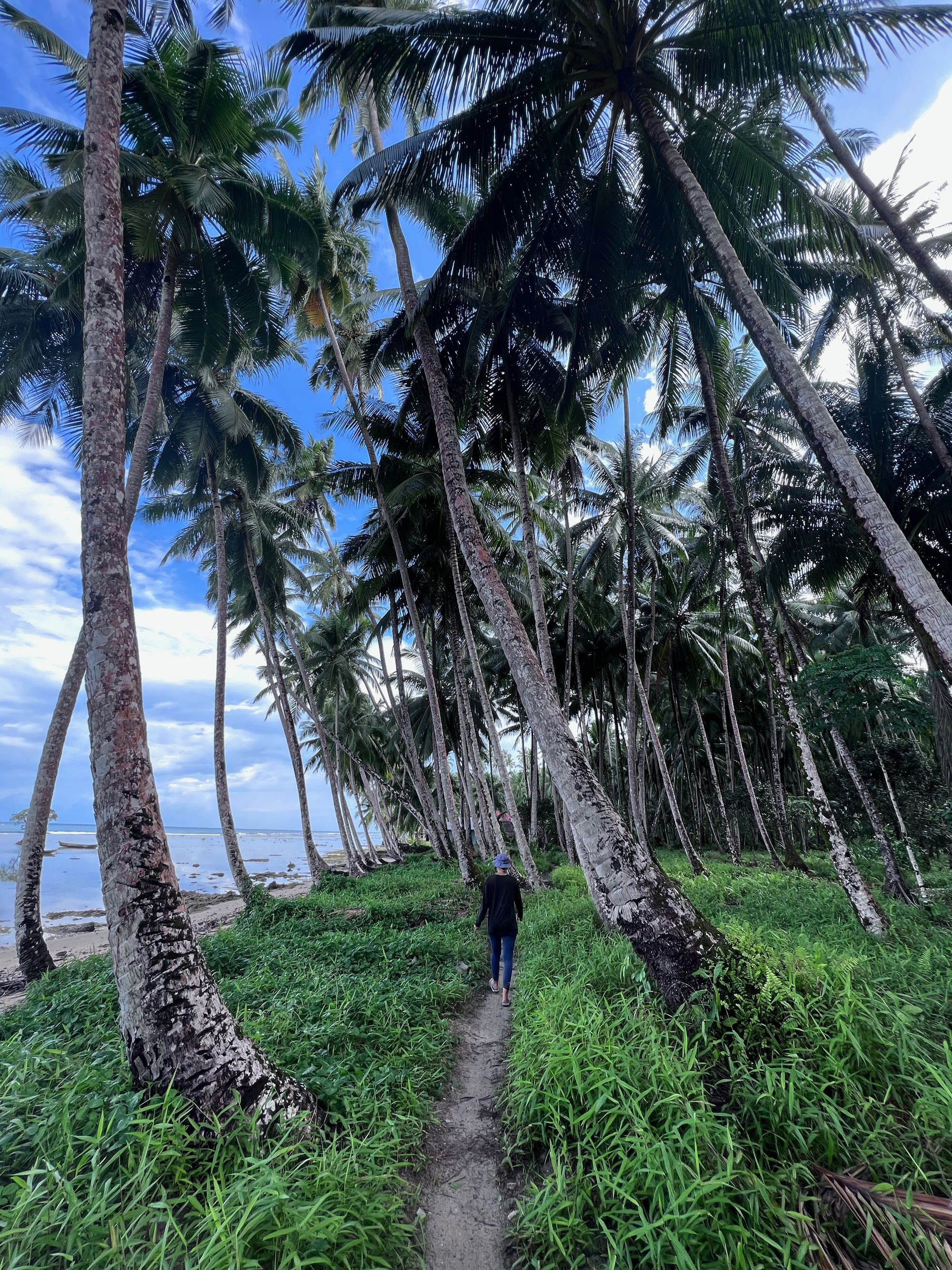
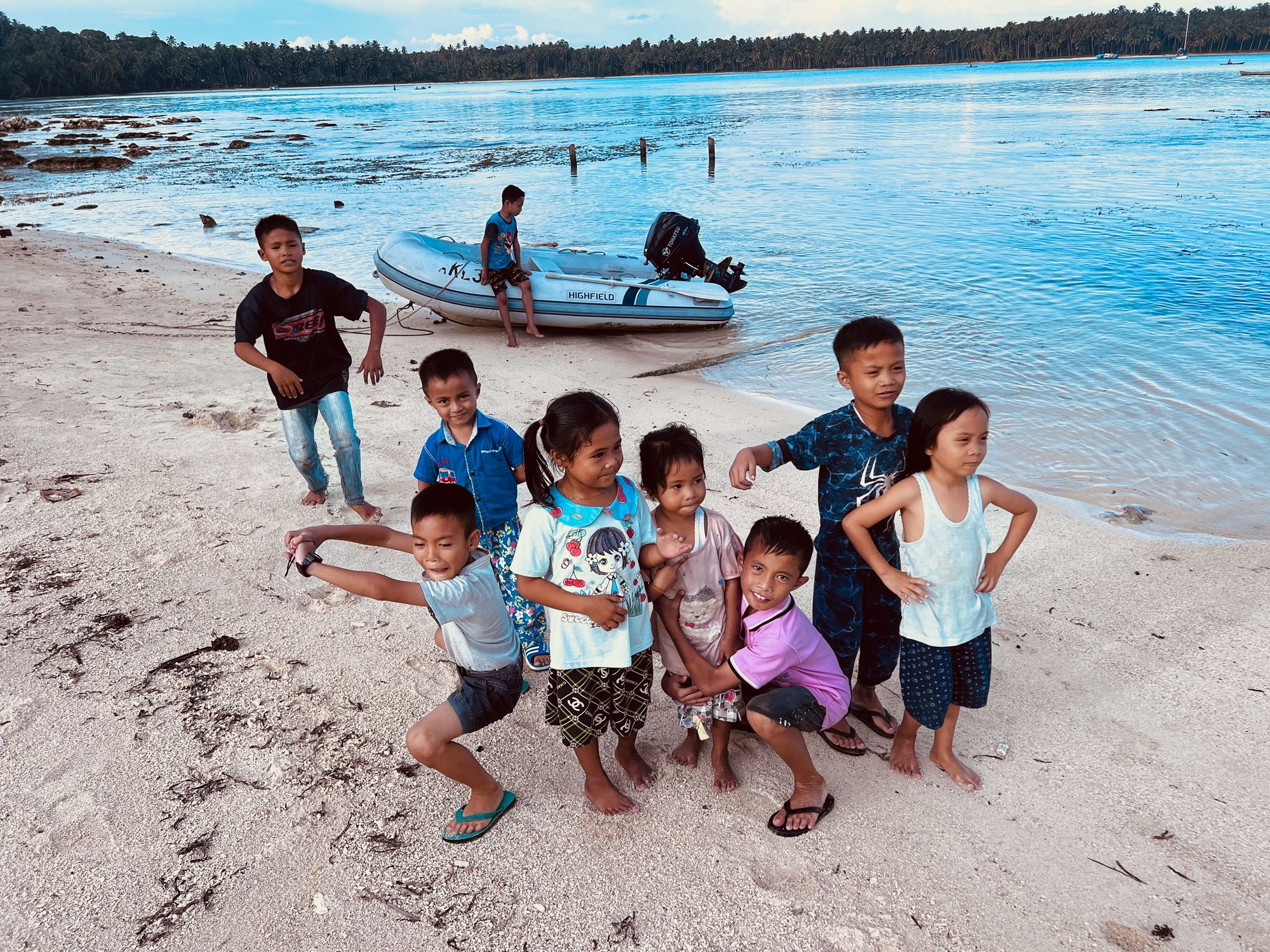
Resort guests arrive by speed boat which drops them off on the beach / reef in front. We walk there through the neighbouring village, along the narrow dirt path hugging the shore.
The resort has to get everything shipped from the mainland so Graham and I walk over one day to see if they take ten of us from three different boats for lunch the next day. The owners are super friendly and offer free coffee while they check with the chef. Yes they can, and we're in and all set for a party the very next day. The lunch is an all you can eat buffet, with loads of salads we haven't seen in ages and even freshly steamed broccoli, an untold luxury!
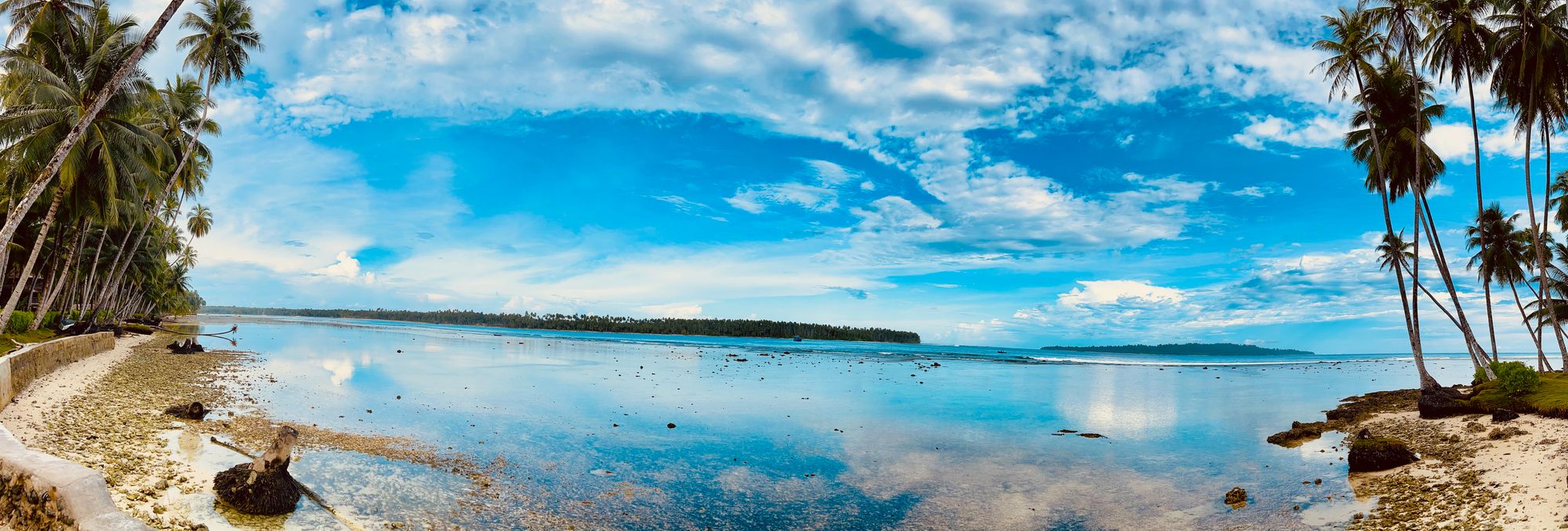
The village is a real treat to explore, with small bamboo huts hidden among the coconut trees and colourful houses (both traditional and modern) lined up in rows with tufts of extremely soft, light green grass forming an enchanting lawn all around them. Waves and smiles welcome us everywhere we go.
It always amazes me how friendly people are here, we're just random strangers showing up unannounced, walking through their place. Nothing but smiles and invitations to come in or perhaps a selfie or two.
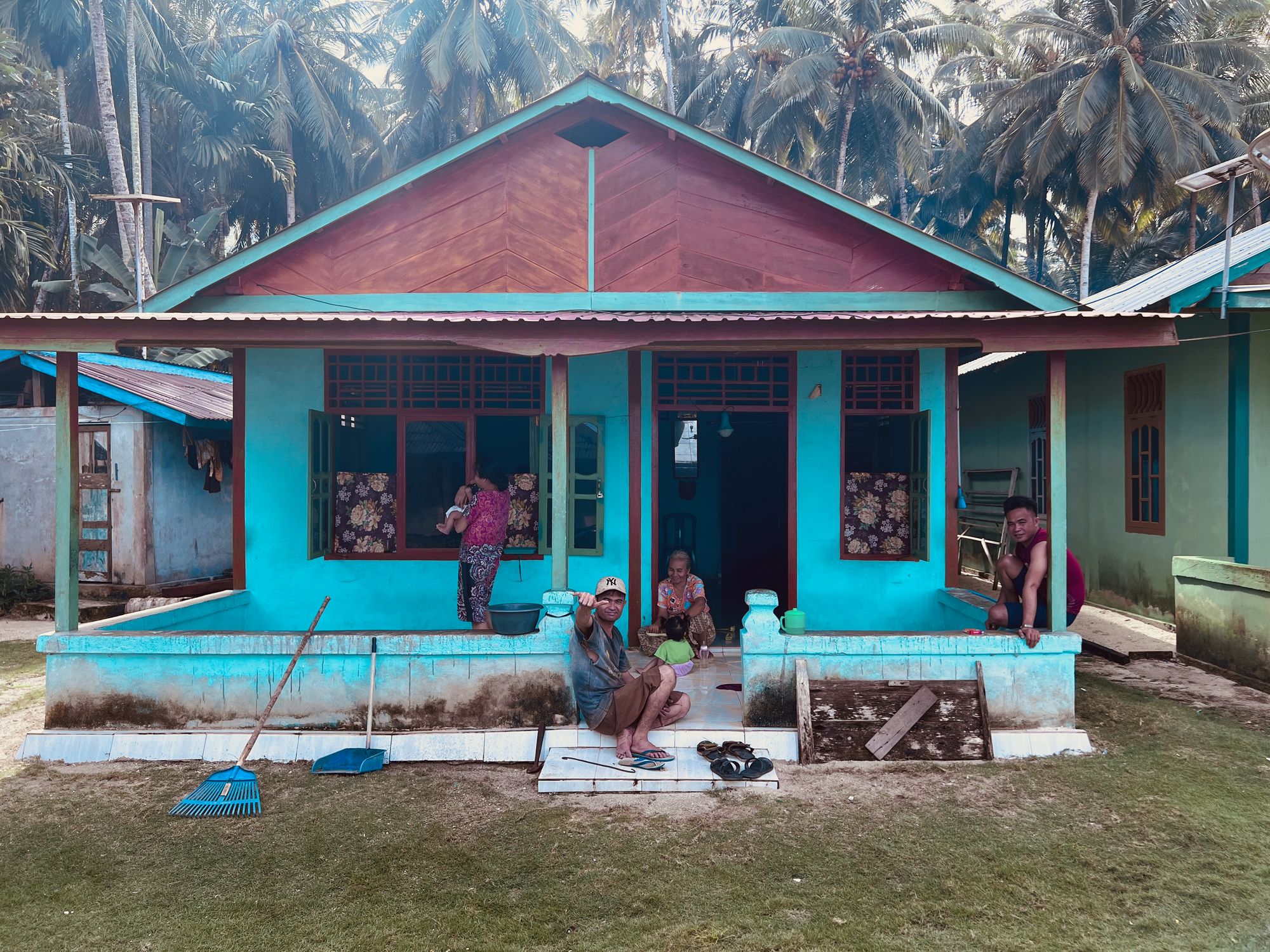
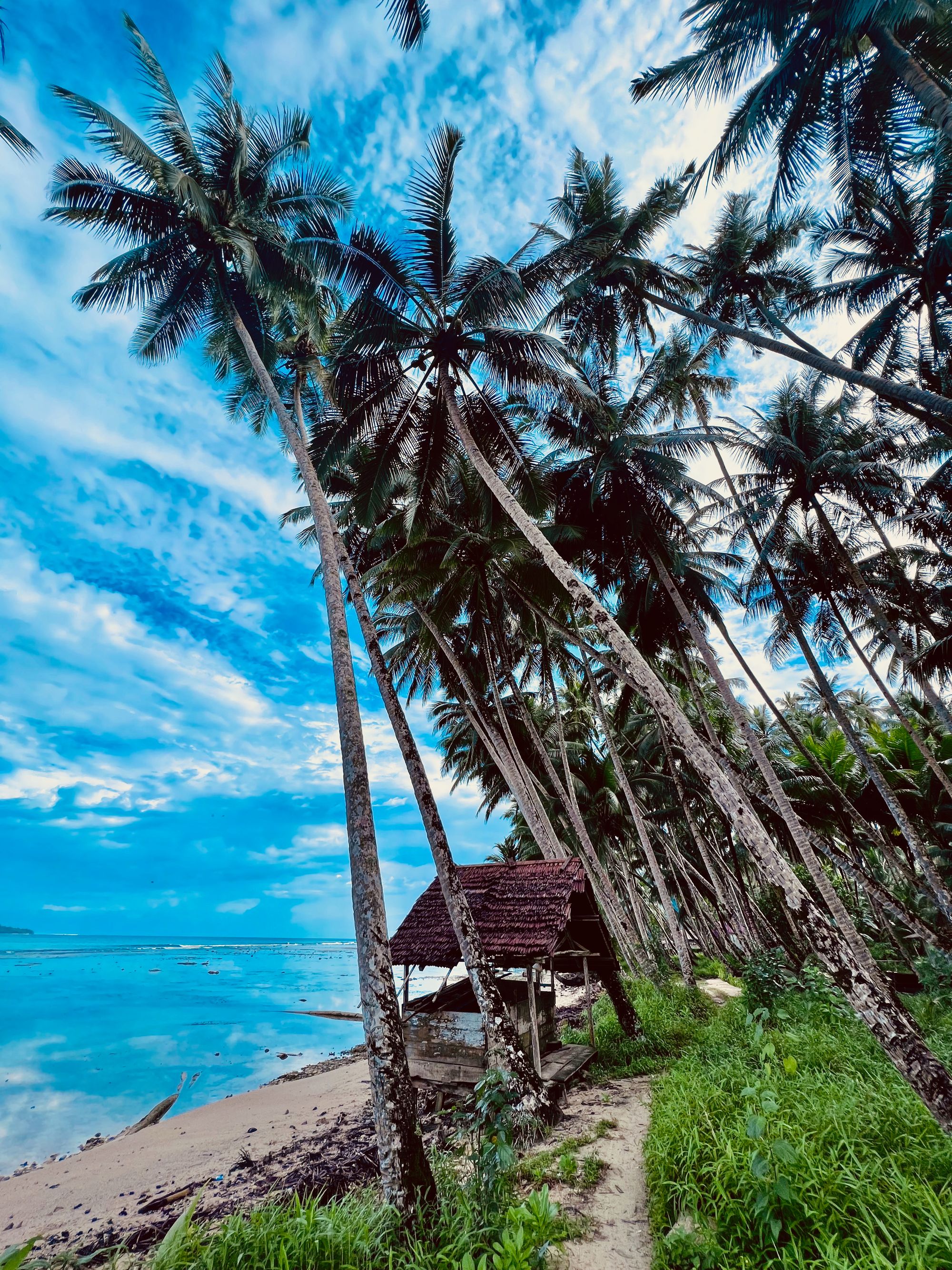
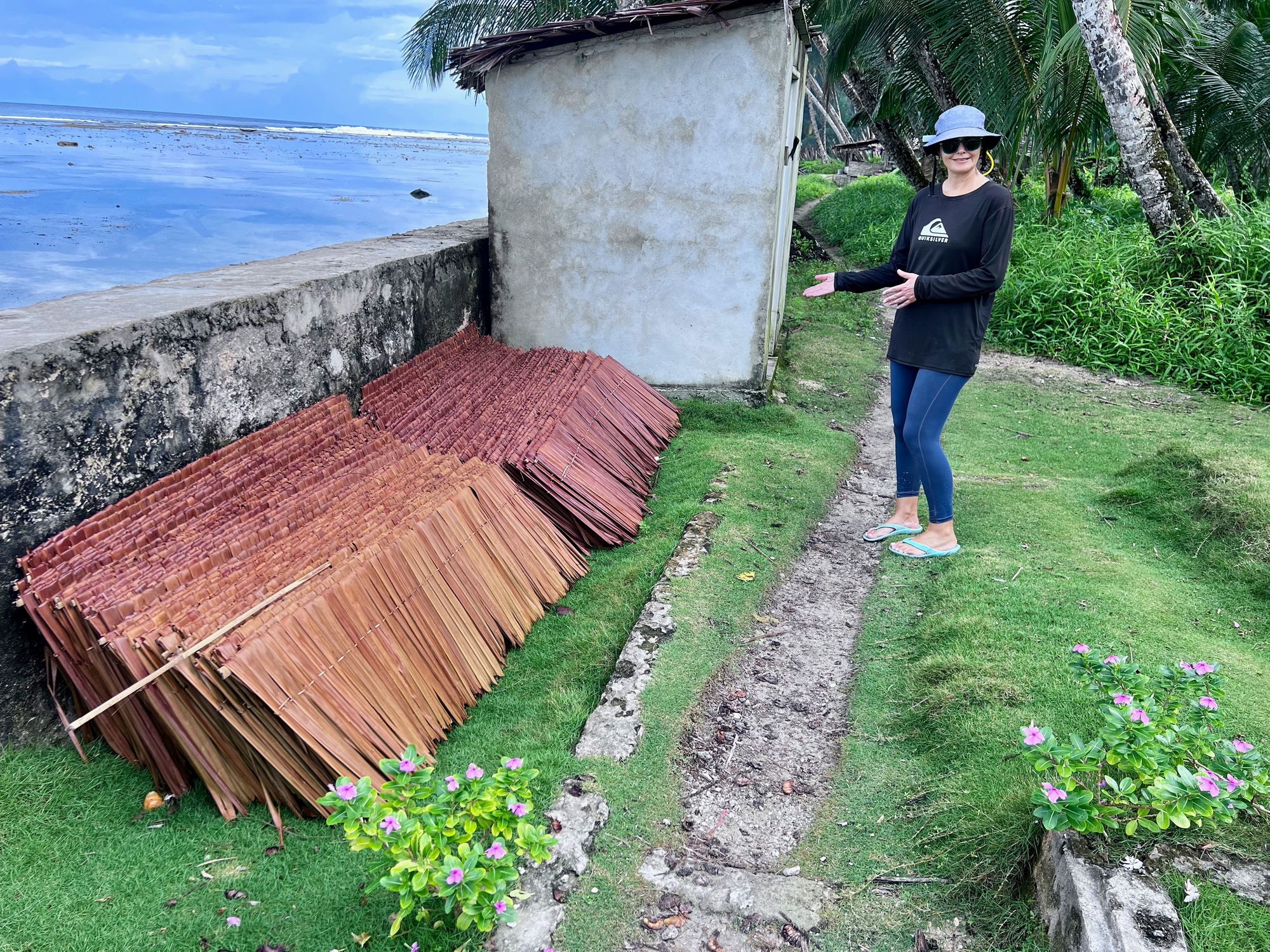
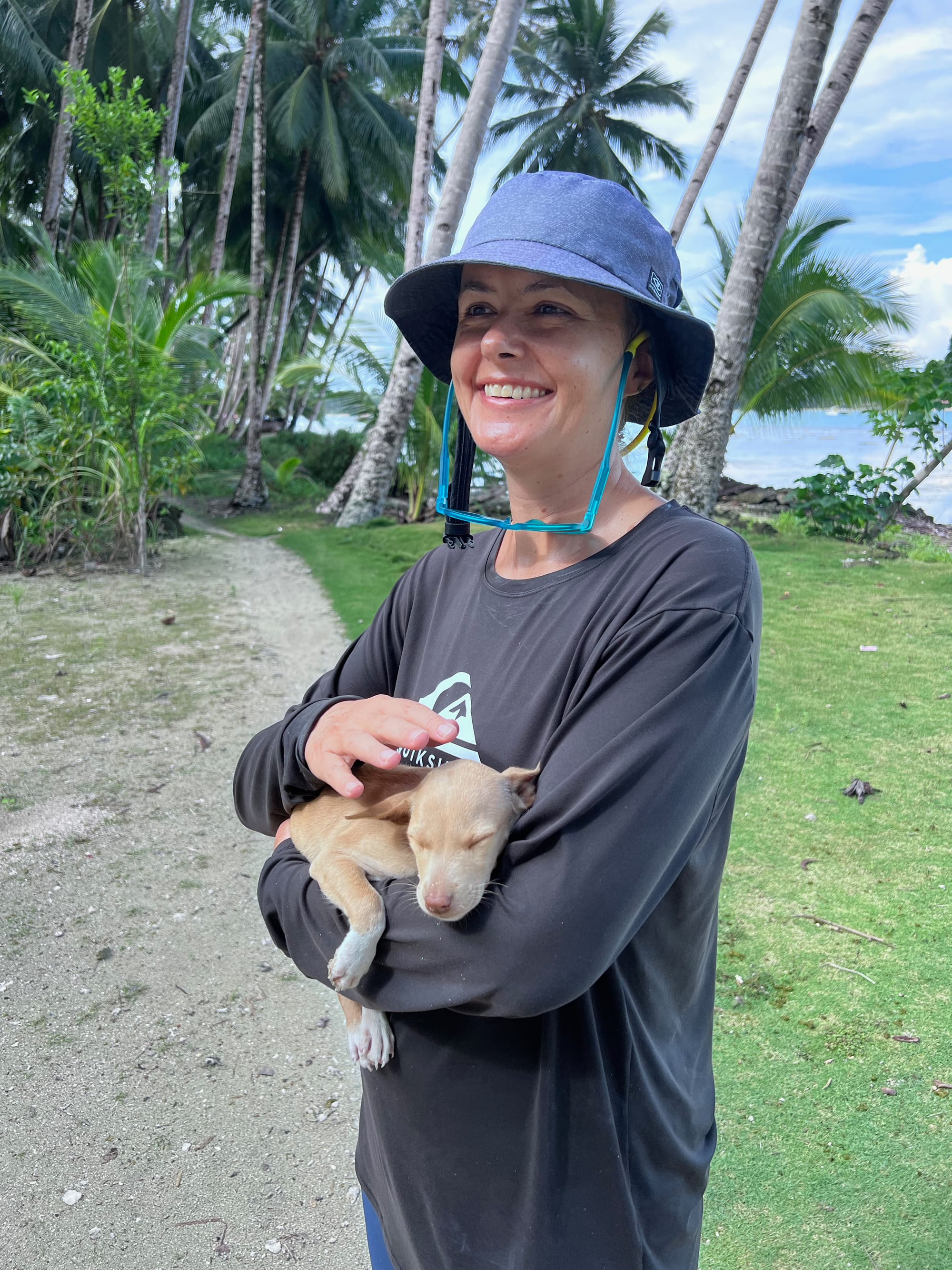
The drying palm fronds are used for roofing and replaced seasonally
From the resort we find out the village is run on a coconut economy with wealth directly correlated to the number of trees a person owns. Not surprisingly, coconut trees cover the entire island. The young, green nuts sell for about a dollar (Australian) each; we've accumulated quite a few on the boat from passing locals. They are an absolute delicacy, the juice light and just sweet enough to refresh without being overbearing. Some even have a little bit of soft, white flesh on the shell, we scoop this off and freeze for making thickshakes so creamy they are addictive.
This is also the first place we hear about coconuts used in peace negotiations. Some time ago, we're told, a local war broke out between the two villages perched on opposing ends of the bay, over a perceived attack on a village chief's son (which was in fact an accident). As machetes were loaded into canoes to paddle over and settle the matter, a last minute council ruled that the wrong may be righted with a significant donation of coconut trees instead. Coconuts for peace, it has a certain tone to it I think.
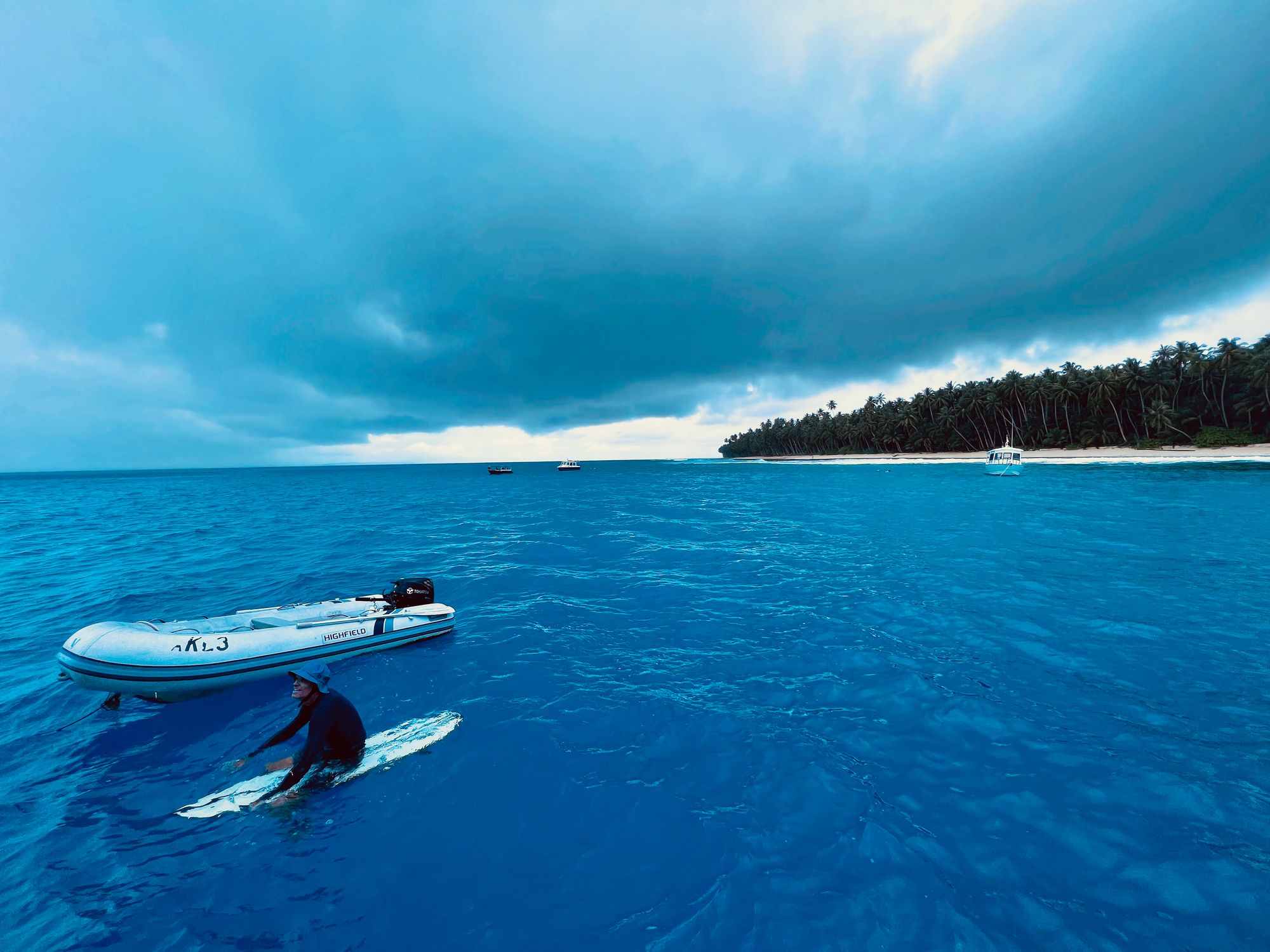
One day, a local paddles up bringing $230 US to trade. ATMs, especially working ones, are non existent in these islands, so all we can spare in rupiah is the equivalent of $30 US. He still hands over the $230 and with some difficulty and the help of Google Translate, we explain the conversion rates and tell him to hang on to the remainder. Later we find out that visiting surfers tip in US dollars and the islanders, having no practical use for this currency, can't wait to swap it for something useful.
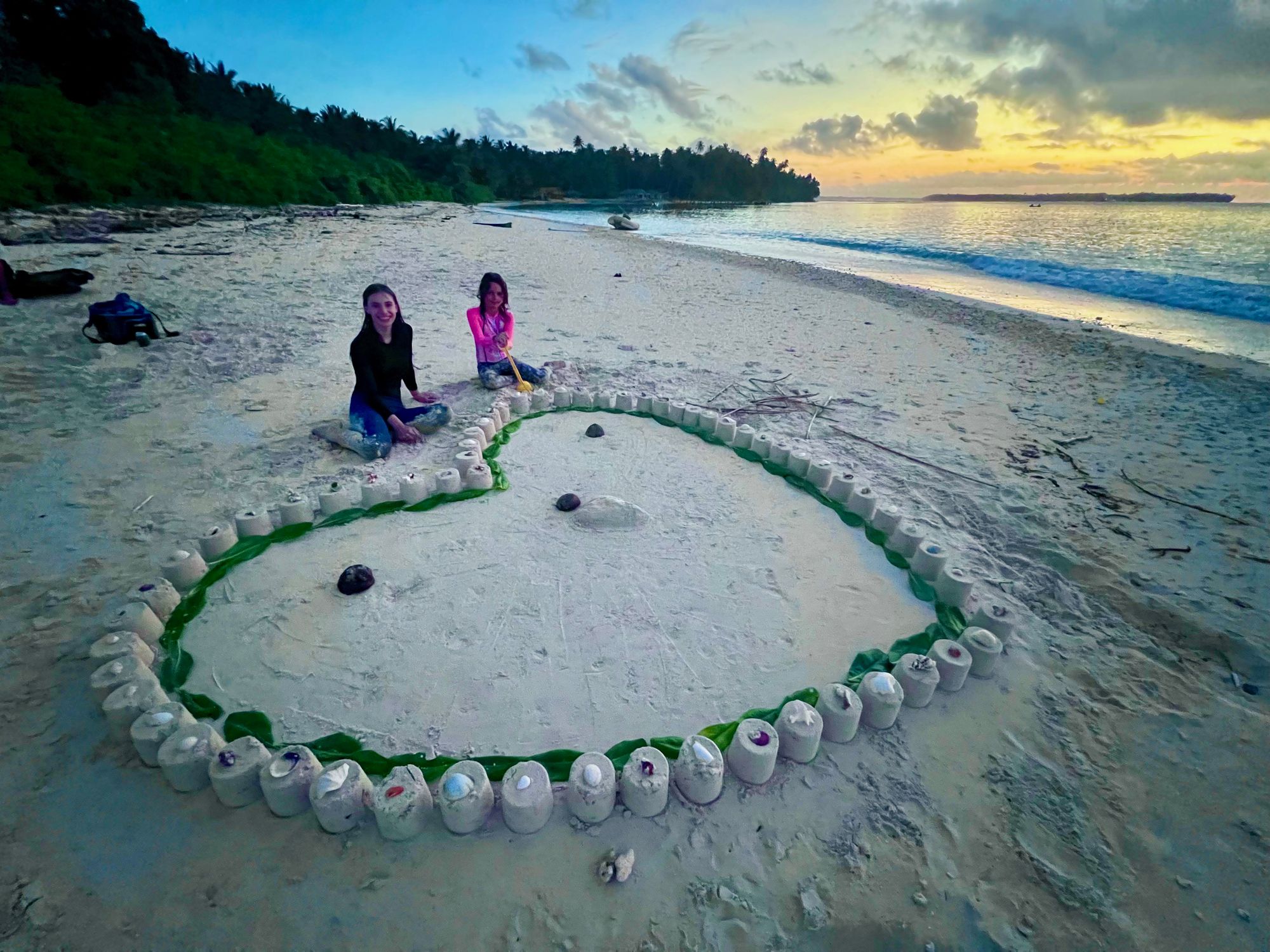
Telos is difficult to leave but leave we must due to our fast expiring visa. We gave ourselves just under two months to cover 1000nm of West Sumatra, consequently we must skip a whole lot of beauty to avoid trouble with Indonesian authorities. It's a 1million rupiah fine per person per day for every day you overstay your visa, so $400 AUD per day for our family. In Australia, visa overstays probably land you in immigration detention so this doesn't seem unreasonable but we'd rather save our money for the upcoming Thai food safari.
A few days before we are due to head north to the next island, Nias, we hear reports of a bunch of Australian surfers and their guides lost in a storm travelling by traditional long boats. A huge search effort kicks off to find them involving Indonesian navy, local authorities and all boats in the area. By the time we get to Nias, the four surfers are found floating on their surfboards but one of their guides is sadly forever lost at sea.
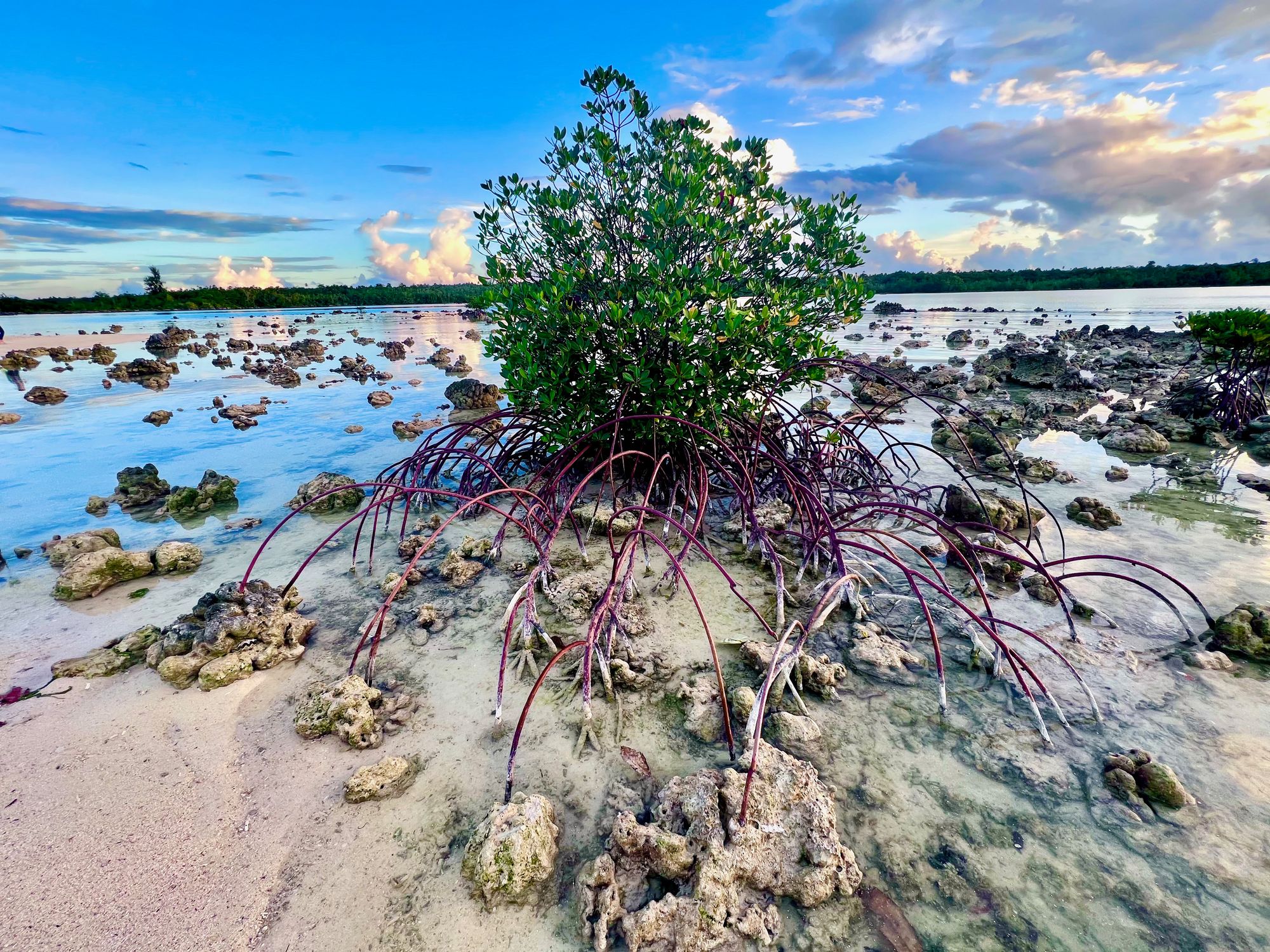
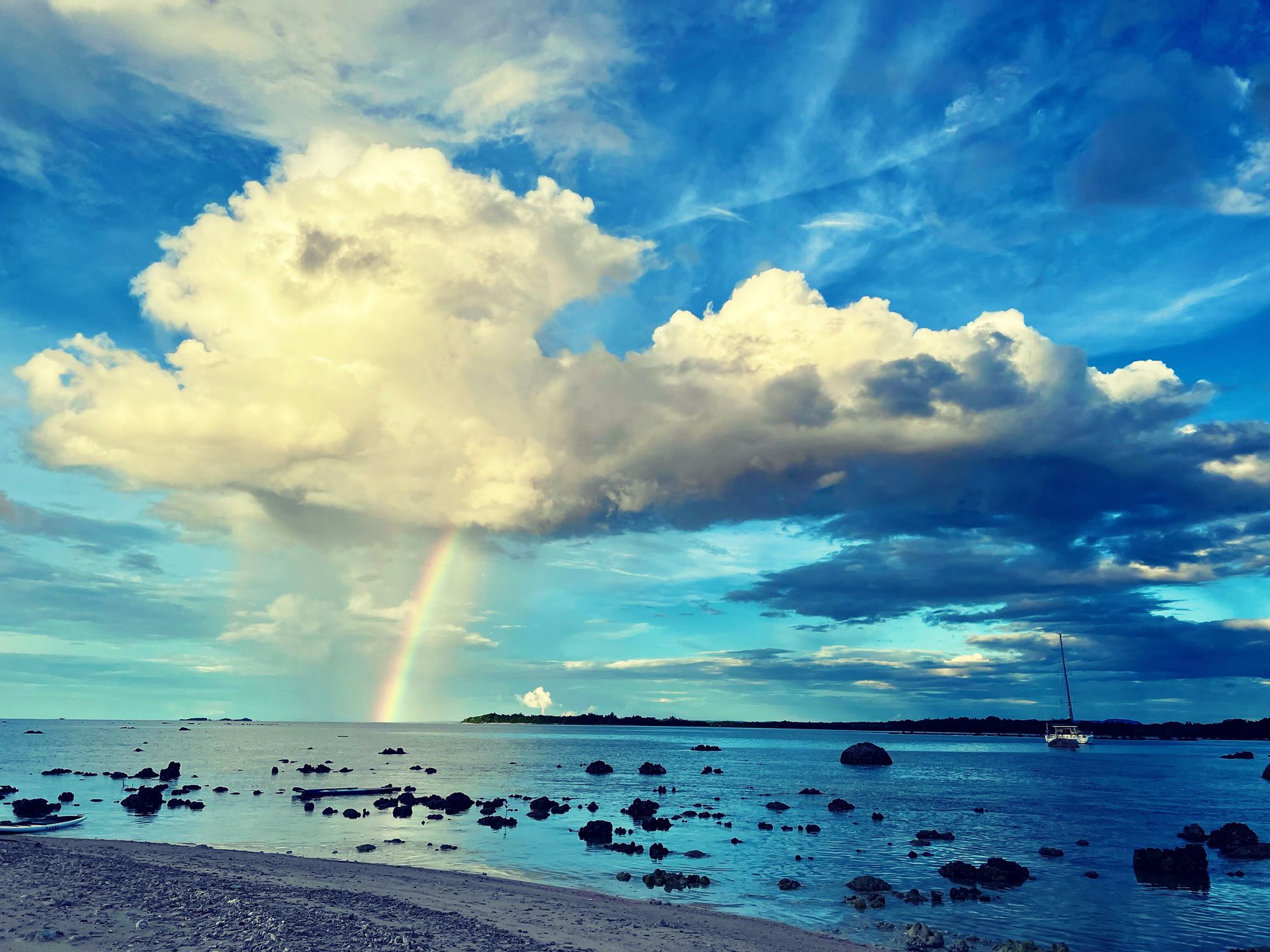
Somewhere in the north of Nias
Very lucky ending for the surfers as the Indian Ocean is extremely unpredictable, distances between the islands large and storms very frequent. On more than one occasion, we meet traditional long boats packed with foreign tourists and their boards, heading off on miles long trips to surf breaks or back to their resorts just before dark. Our friends, Saltys found one boat drifting off an island, helped them with engine trouble then saw them take off trying to cover 30 miles after sunset. It's a wonder there aren't more lives lost as thousands visit here every year.
Grateful for our big and safe boat, northwards it is for us to cover 600 miles or so, with brief stops in Nias then Banyak islands for a few days each, just enough to feel a sense of regret about not being to explore more.
From here is's basically passaging towards Sebang in Banda Aceh, where where we plan to check out of Indonesia before sailing over to Thailand.
North Sumatra is mighty, jungle covered and breathtaking in equal measure. We catch but a glimpse on our rest stops but it leaves enough of an impression to add it to the long list of places to re-visit. At some point!
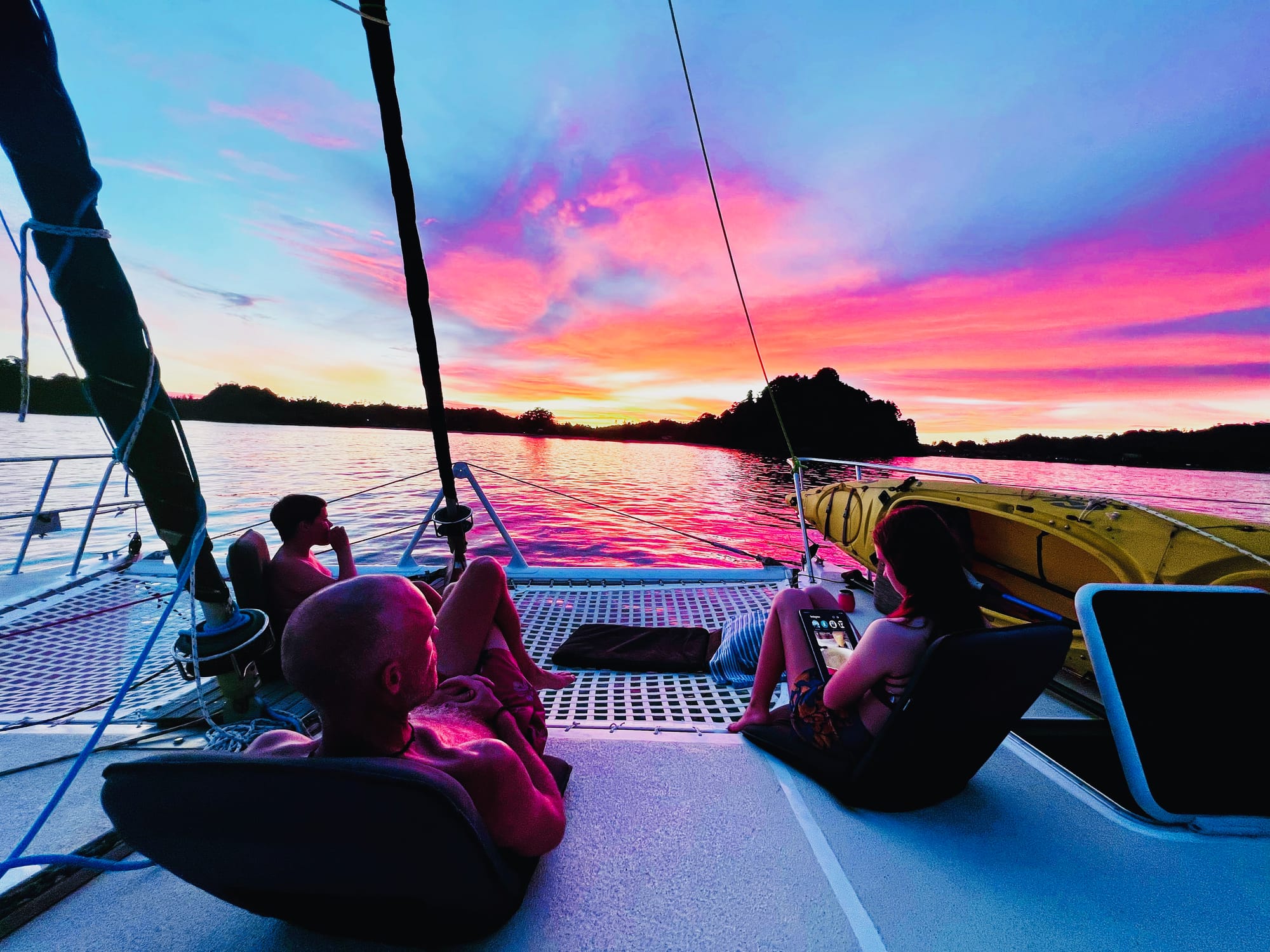
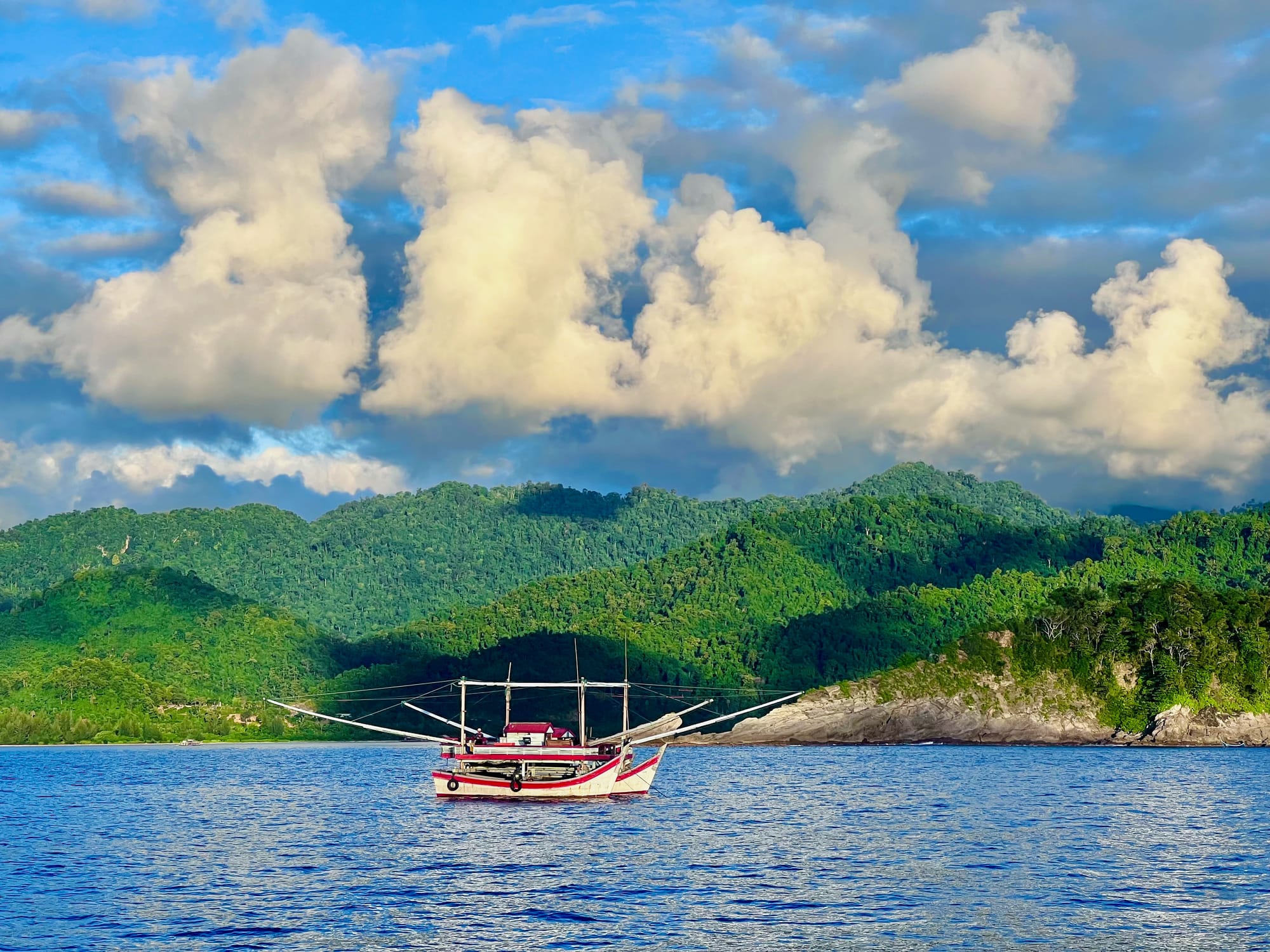
Perched on a tiny island just north of Sumatra, Sebang is a cute border town buzzing with activity and green, shady avenues which make for very pleasant walking. We allocate half a day to check out of the country and it starts well enough with immigration and customs who wave us through in record time.
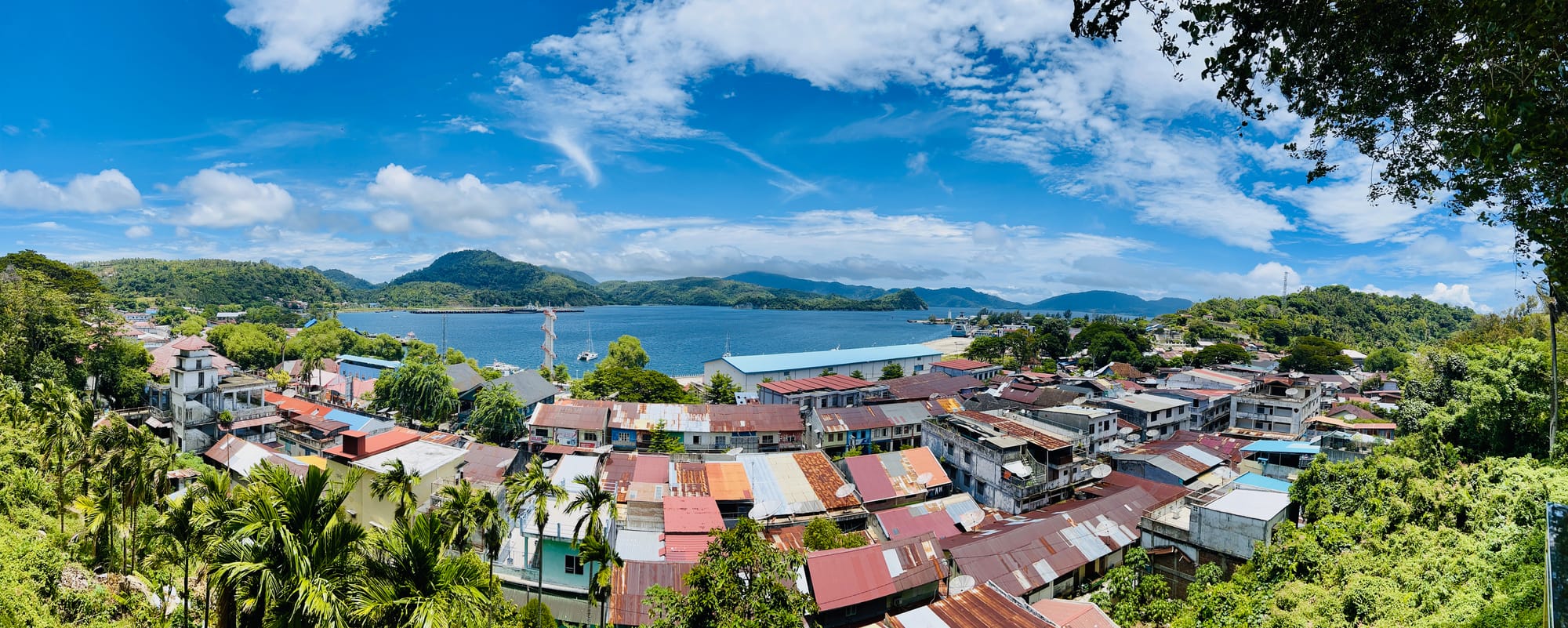
Trouble starts when we get to the Harbour Master who now needs us to visit Quarantine (why?!) and another office I've forgotten the name of before he will issue the sought after Port Clearance, a must have document for when we arrive in Thailand.
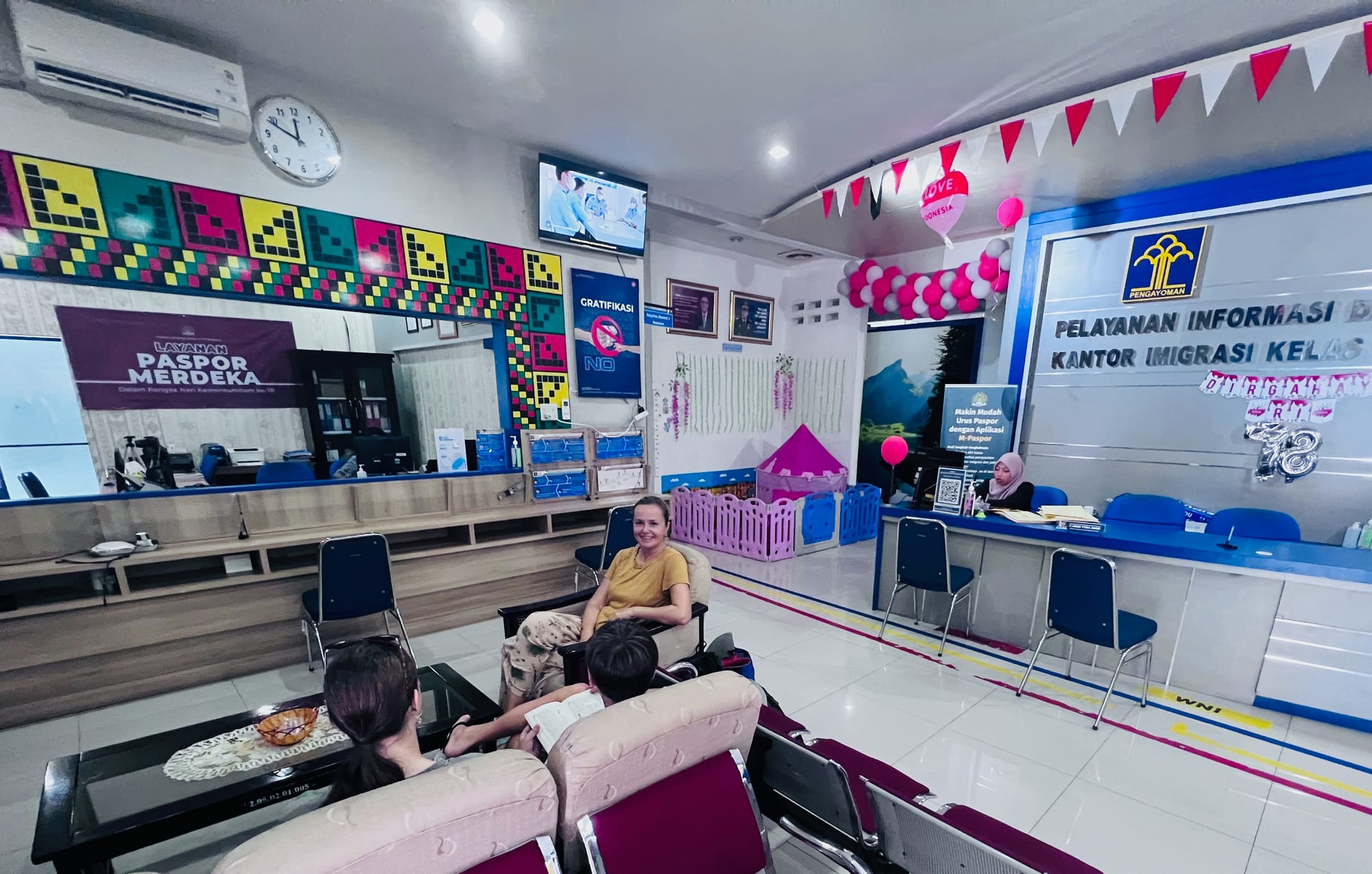
So now we walk back in the heat to a random building a kilometre down the road, just a little bit grumpy about the two extra steps added to our check out process. In an effort to divide and conquer, Graham heads to the unnamed office and I tackle quarantine, which is a tiny dishevelled office with a single counter with no one behind it and a few rickety chairs to sit on. No air conditioning and a single working fan, this being the key point of contention.
There is however a guy, sleeping in an adjoining store room. Kids and I promptly wake him, thus suitably startled he promises to 'call a friend'. We sit there for an about an hour until said friend and an extra arrive, a lot of serious typing and processing ensues and viola we get our quarantine document after an additional hour or so. But not before some to and from about covid vaccines which they want to see proof of. This wouldn't generally be a problem as I have mine and the kids' certificates on my phone, except that I left said phone on the boat.
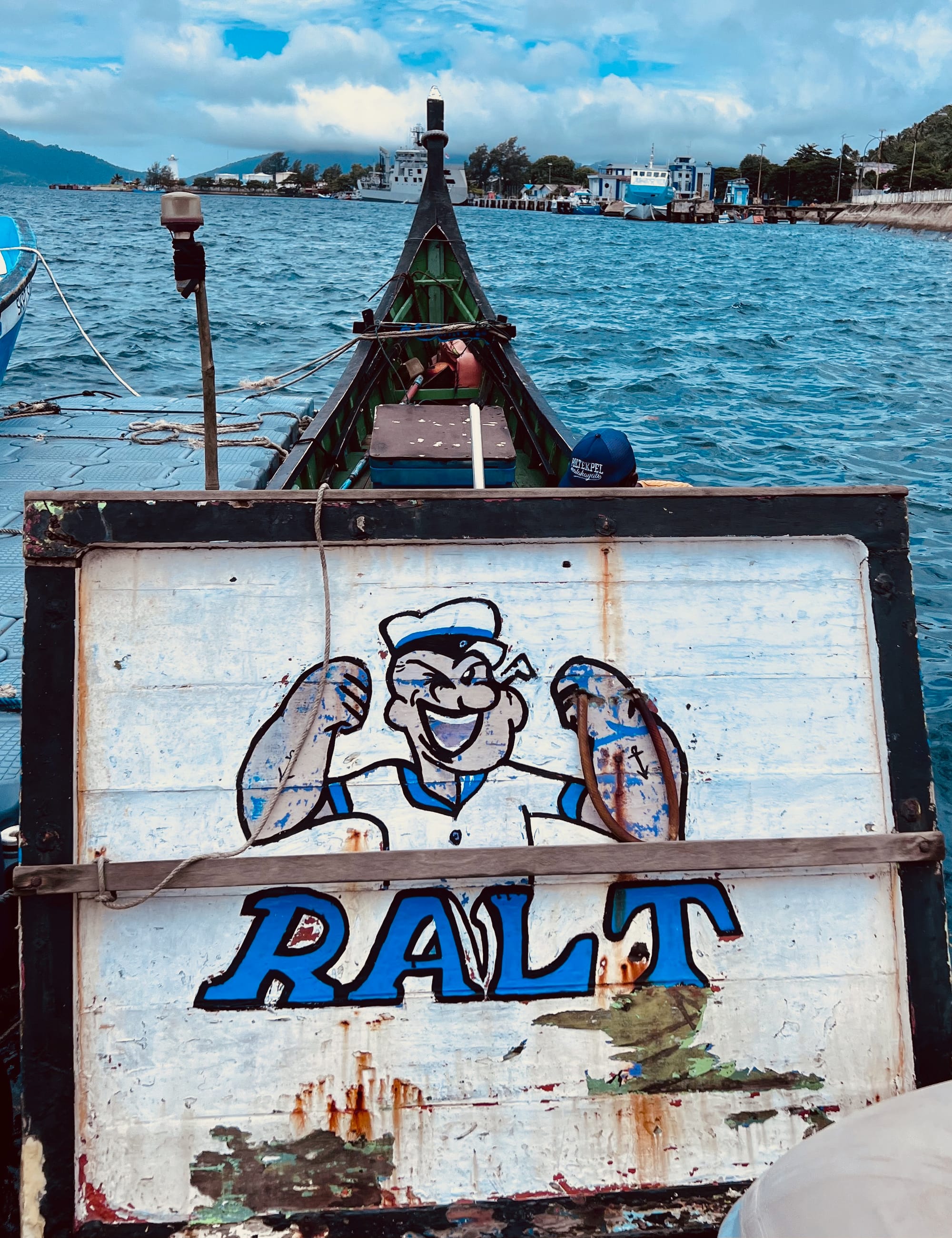
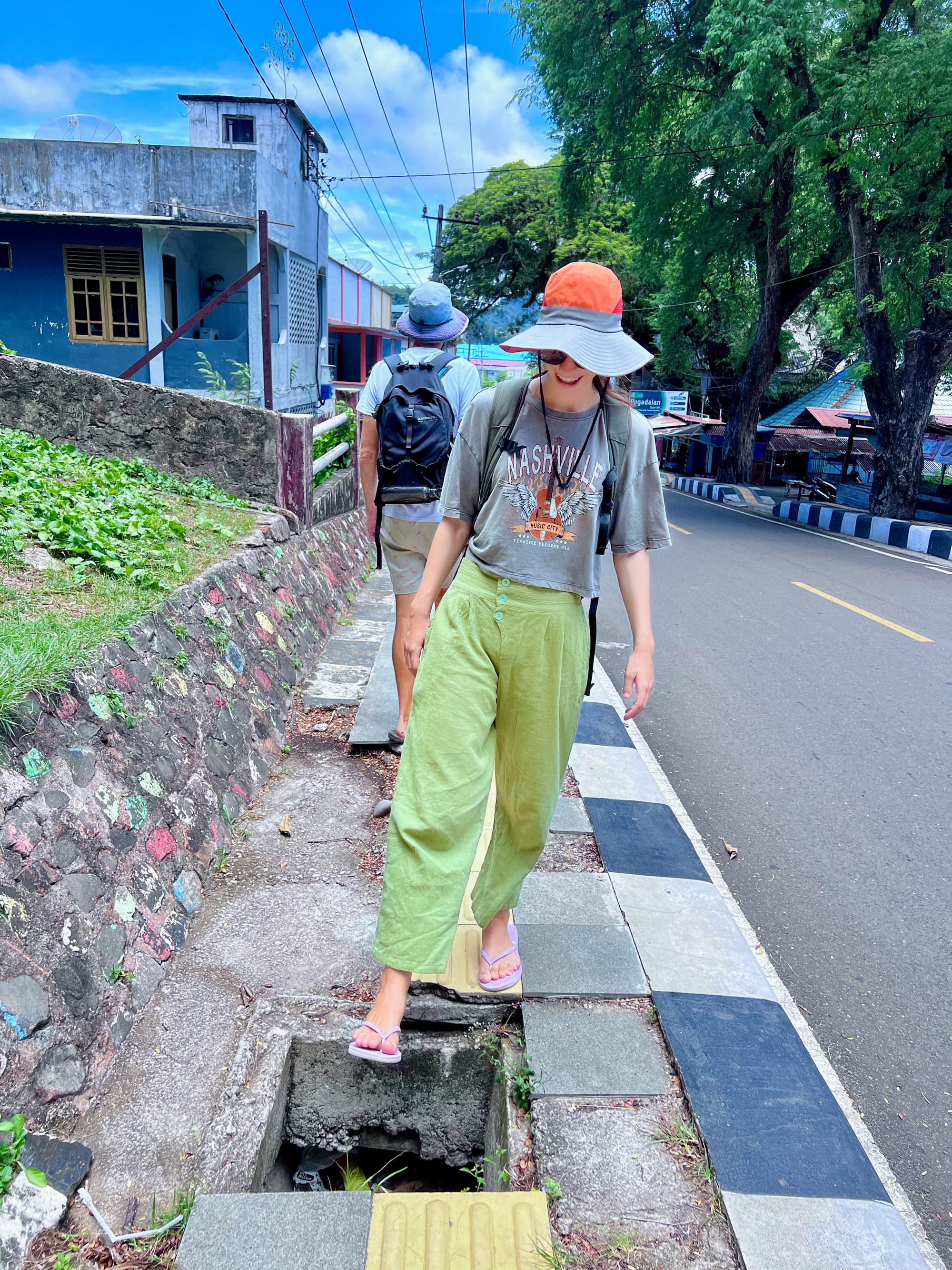
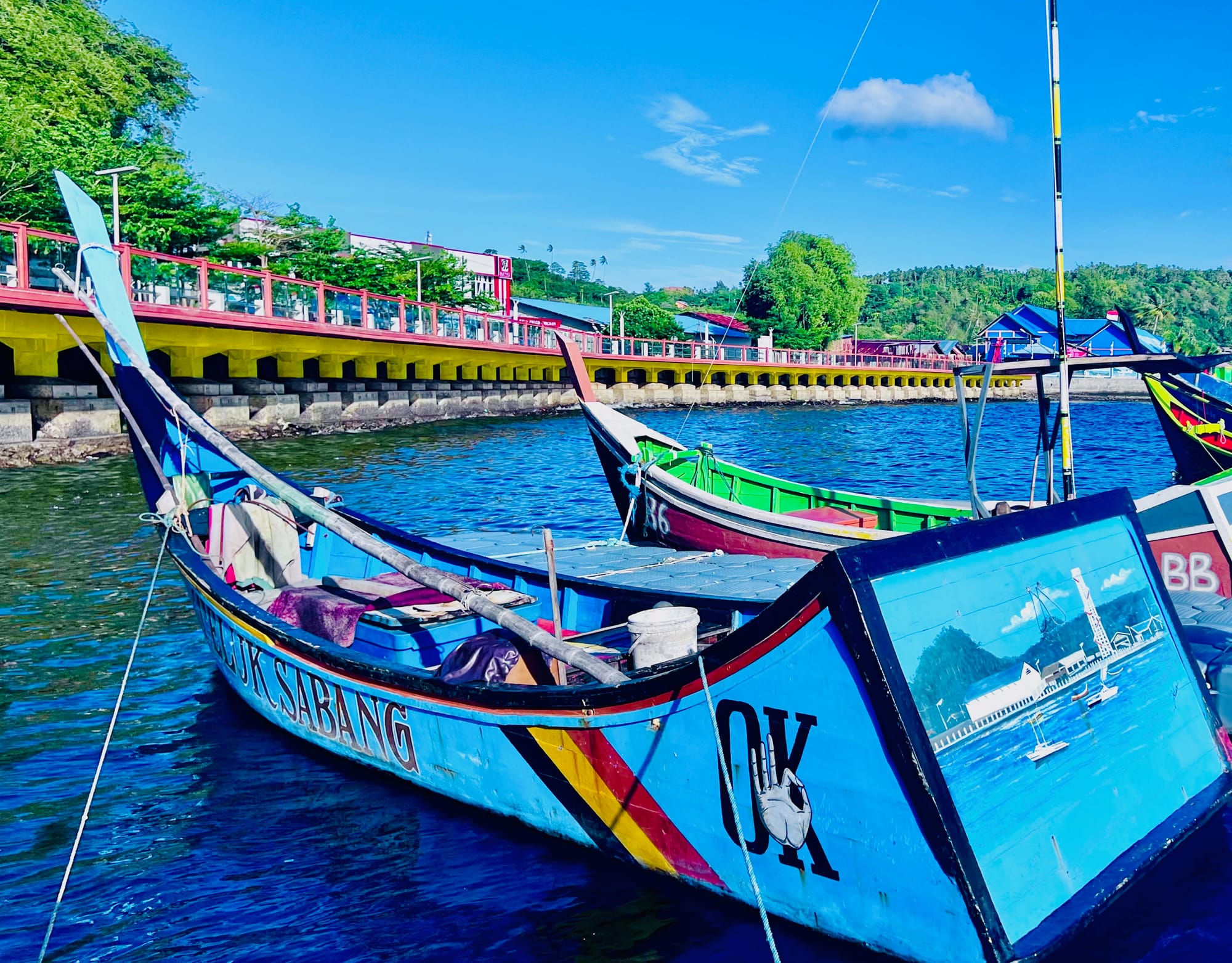
Sebang
At first we question why (you don't even need them to enter Indonesia!), but then we remember this is not the right approach with provincial officials who never got the memo but still need to tick their boxes. Graham thankfully has his phone and after flashing his covid certificate at them, pronto! we have our piece of paper. The other office we were supposed to go to produces no document but I never find out why not or why this isn't an issue when we return to the Harbour Master. And at this point, I am too tired to ask. The point being, we have our Port clearance document, passports are stamped, we grab a last minute Indonesian meal and it's Thailand time baby!
